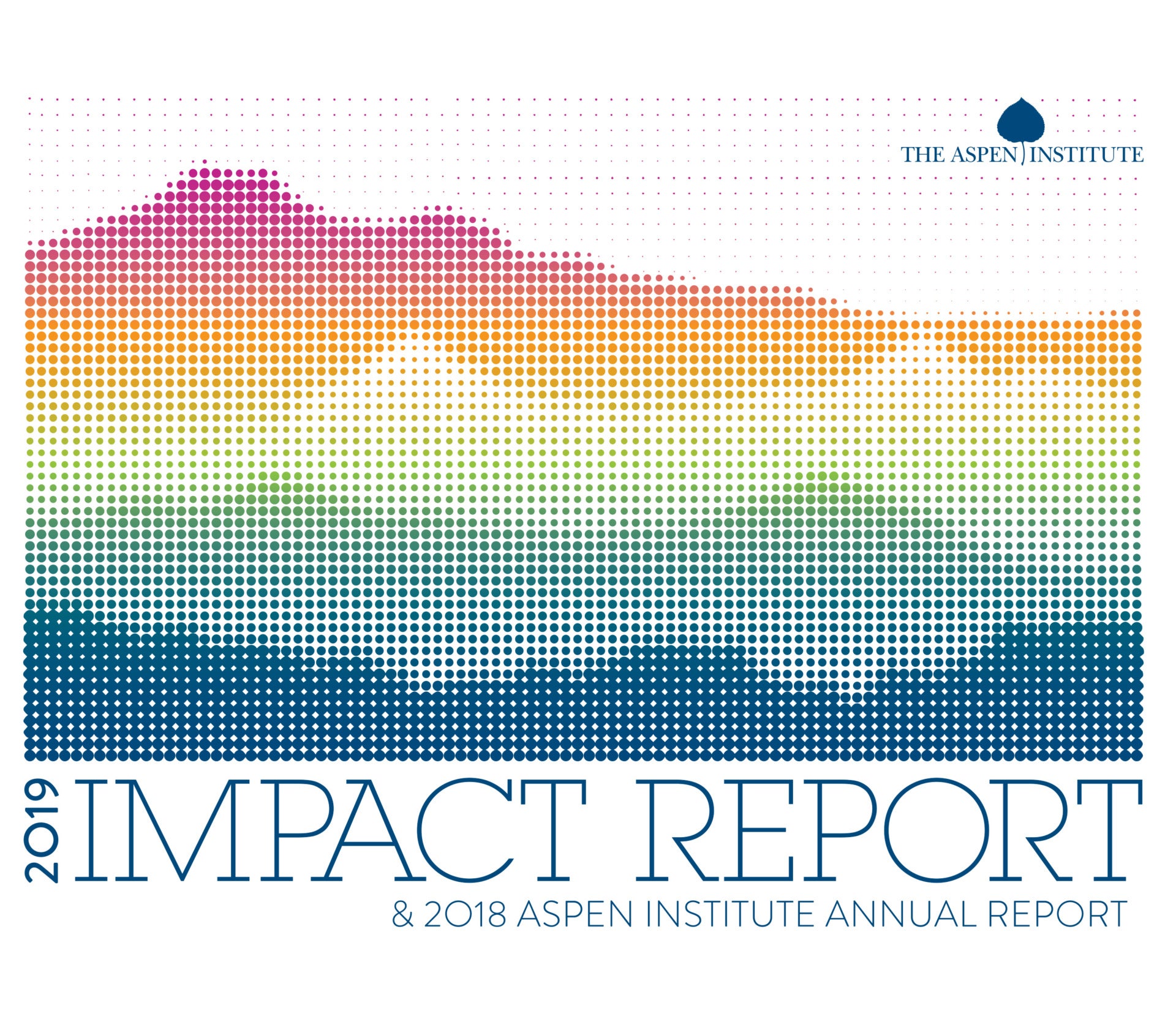At the Aspen Institute, effort and impact have a human face. We build networks of values-driven leaders committed to creating positive change in the world. We convene diverse thinkers and doers to find paths to solving critical problems. We help citizens lower barriers to learning, work, and health.
- Community
- Leadership
- Public Programs
- How to Measure Impact
- Youth Programs
- Aspen Around the World
- Education & Families
- Politics
- Security
- Communications
- Seminars
- Giving Thanks
- Statement of Financial Position
For 70 years, the Aspen Institute has worked toward a vision of a free, just, and equitable society. These are lofty ideals, and sometimes they seem abstract—until we think of them in terms of real people and demonstrated progress.
In these pages, you will read about programs that are developing best practices for addressing the challenges of job quality and financial security that affect millions of American households. And about the team that’s using the internet to connect 40,000 students in classrooms in the Middle East, North Africa, the Palestinian Territories, and across the United States.
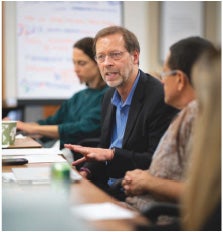 At the Aspen Institute, effort and impact have a human face. We build networks of values-driven leaders committed to creating positive change in the world. We convene diverse thinkers and doers to find paths to solving critical problems. We help citizens lower barriers to learning, work, and health.
At the Aspen Institute, effort and impact have a human face. We build networks of values-driven leaders committed to creating positive change in the world. We convene diverse thinkers and doers to find paths to solving critical problems. We help citizens lower barriers to learning, work, and health.
Today institutions like ours must make a difference. There’s a hunger for hope. We need to come together to drive progress in addressing threats like climate change, economic insecurity, racism, and polarization. In many of our local community programs—in rural America, in community colleges, in youth leadership centers—the Aspen Institute is joining grassroots leaders to solve problems that aren’t being addressed through the national political process.
The disruptions and anxieties of this age call us to deploy our values and strengths to compete confidently to make genuine progress. As this report shows, we’re doing just that in many ways—right now.
I invite you to read about the myriad impacts our people and programs make near and far in partnership with a rich diversity of individuals, funders, and communities. Some benefits of our work bloom over the course of many years. Others are quickly apparent. Some results are quantifiable and can be shown in data and charts. Others are best told through narrative and story. How else do you convey the impact of opening a mind?
What’s undeniable is that the Aspen Institute is an institution that matters—now more than ever. And we’re setting big goals to create more major, high-impact initiatives in partnership with local communities, and enable more priority-setting and collaboration among our more than 60 programs.
Thank you for your support. Together, we can tap our shared love of humanity to create a flourishing world for all.

Daniel R. Porterfield
President and CEO
COMMUNITY: LOCAL LEADERSHIP
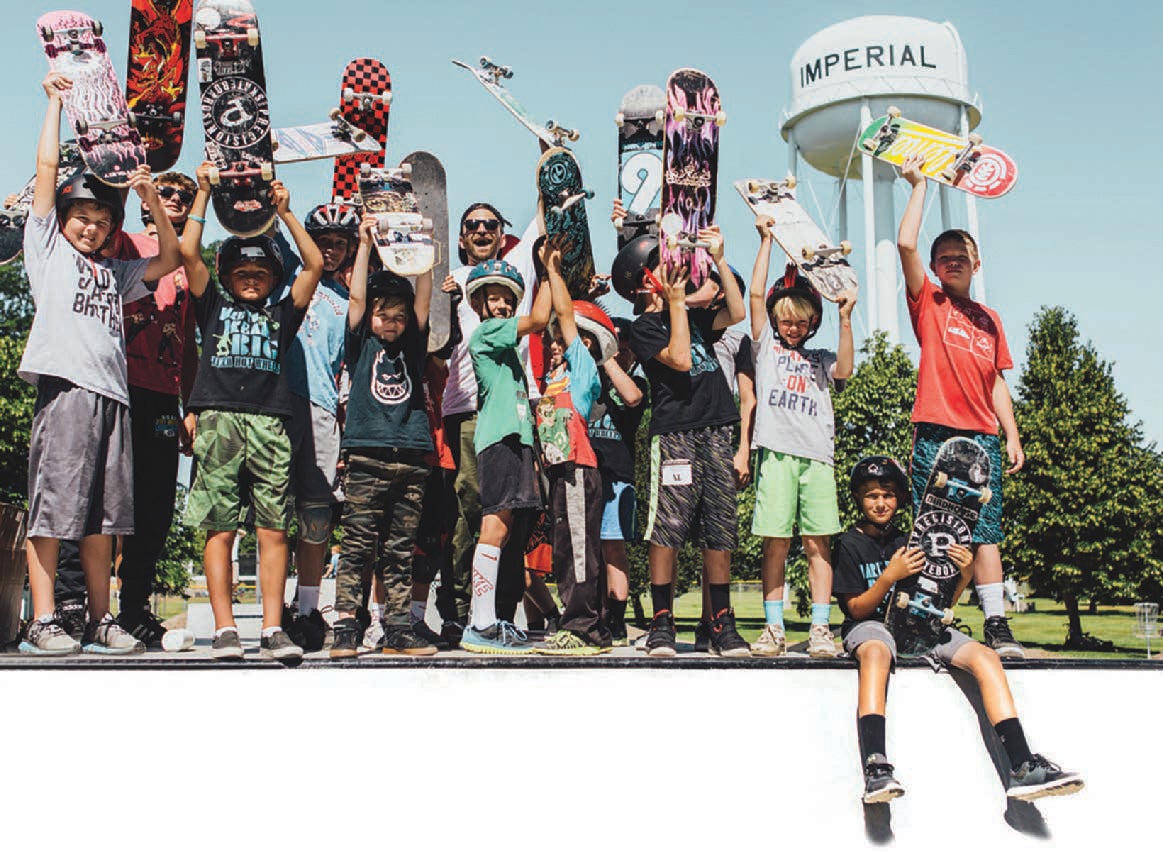
TRY THE BELOVED COUNTRY
Janet Topolsky
Since the day I arrived at the Institute in 1993, fresh from living in a series of cities across the country, rural people and places have claimed an ever-larger piece of my heart and mind. The Community Strategies Group, which I direct, was born in 1985 as one of the Institute’s first policy programs. We focus on building healthy economies, fighting family poverty, and strengthening local leadership in rural communities and rural-urban regions.
“The Community Strategies Group has had a profound impact on the growth and evolution of the Nebraska Community Foundation network over the past 20 years. Through well-designed peer learning, CSG has connected us with other leaders doing rural development philanthropy and holistic development strategies. CSG helps facilitate hard, important conversations to build stronger, more equitable hometowns.”
—Jeff Yost, President and CEO, Nebraska Community Foundation
We have many stories to tell about the impact of the Community Strategies Group and the leaders we have been privileged to advise and support have made on the ground. Stories of how to do economic development differently, building from local assets and know-how. Stories of producing goods and services in current demand, rather than throwing financial packages and a prayer at the hope of recruiting the big-kahuna company from elsewhere. Stories of wrapping integrated services around striving but struggling families to help them ear more, keep more of what they earn, and building those earnings into assets over generations. Stories, that is, of the hard stuff—not fads, but what it takes to really change communities, family, and economic outcomes over the long term.
Our work with pioneering rural-focused community foundations has helped change the entire field of community philanthropy. Community foundations are the most flexible form of nonprofit: they can create funds, educate donors, make grants, run initiatives, conduct lending programs, invest assets, and gather people across place, race, politics, class, and discipline. Once a rural foundation succeeds on a key community problem or opportunity, locals turn to them for the next one-and they become go-to organizations.
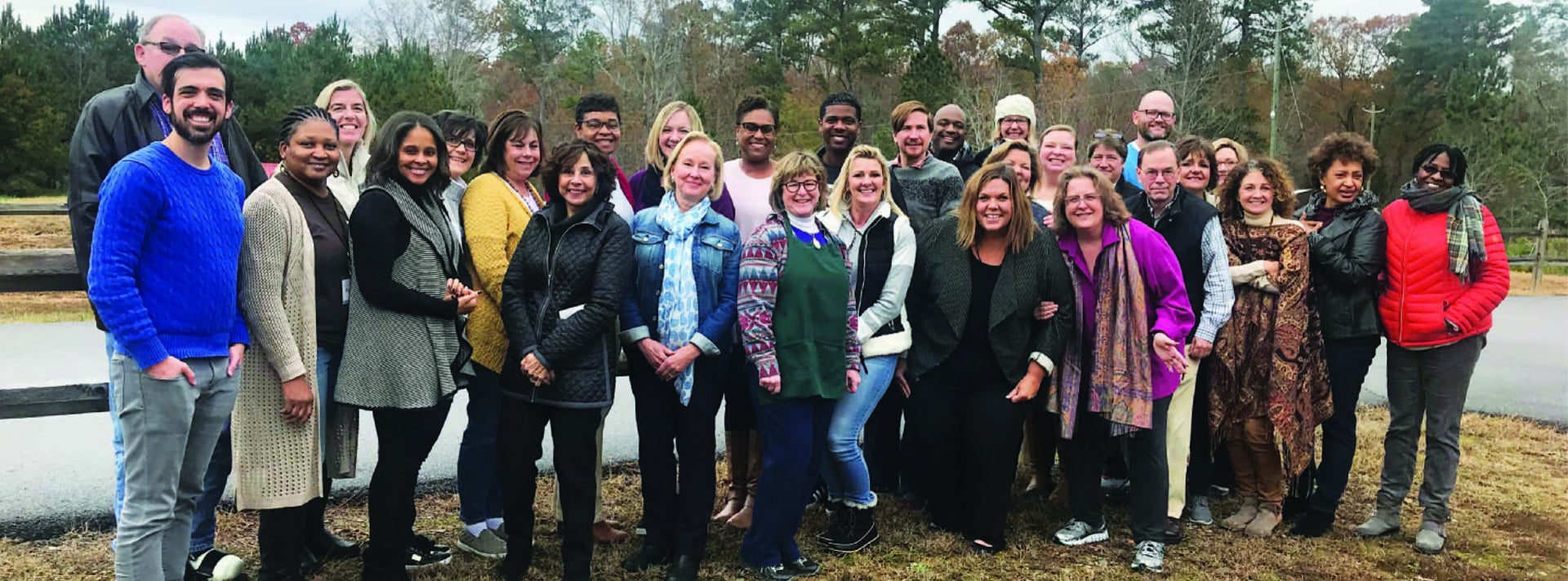
Leaders from three Alabama counties joined by supporting partners from the Women’s Fund of Greater Birmingham and the Community Strategies Group
Through peer-learning networks, one-on-one strategy sessions, and national and regional workshops, the Community Strategies Group has helped build the leadership muscle of scores of community foundations across the country as they take on what we have dubbed “economic development philanthropy.”
“Whether it is braiding resources or supporting people in working together, you need humility. Humility often means you’re working under the radar. That can be said of the Community Strategies Group. It is nearly impossible to create an enabling environment for change if you are not practicing with humility and working toward the goal of collective success.”
—Kelly Ryan, President & CEO, Incourage Community Foundation, Wisconsin
Too few see the people, places, and organizations in rural America that are bursting with innovation. The Institute is fortunate to have within it a program that has consistently kept rural America in the mix and at the forefront of positive change.
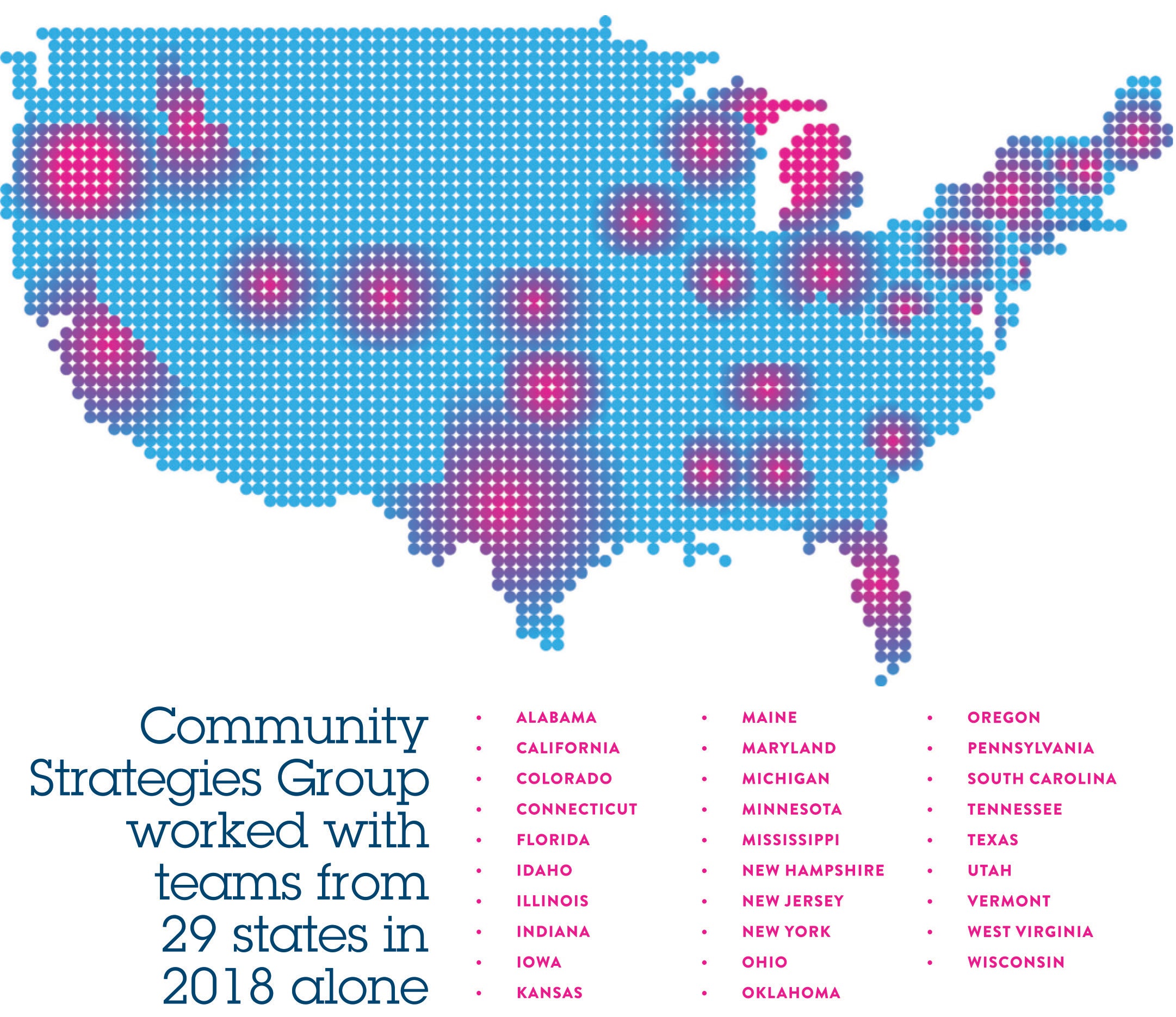
COMMUNITY: BUILDING BRIDGES
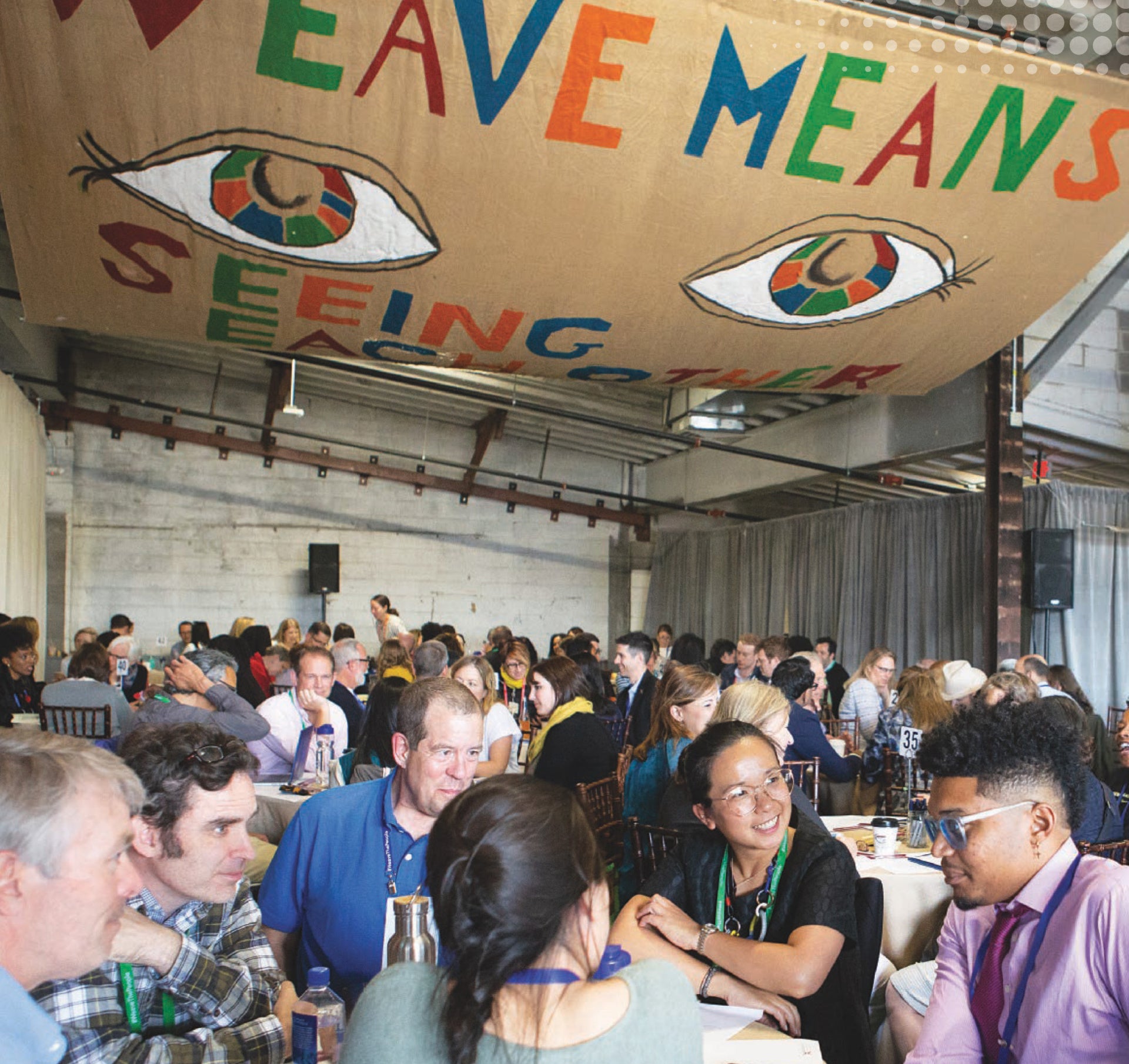
MOVING HISTORY ONE THREAD AT A TIME
David Brooks
What our hearts desire more than anything else is a deep connection with another human being. But many Americans find themselves isolated. Social fragmentation is the core challenge of our day. We are isolated by distrust, polarization, trauma, and incivility. The question for each of us is: what can I do to replace this loneliness, division, and distrust with relationships, community, and purpose?
Weave: The Social Fabric Project is a network of people who are helping each other answer this question. Whether it is through community food co-ops, local coaches, recovery groups, or interfaith dialogue, connection is essential. At Weave, we learn from those who are knitting communities together across the United States. First, we just try to tell their stories. Then, we spread the values they live out every day in dozens of ways, like through initiatives on how to create civil dialogue, how to expand friendships in adulthood, and how to truly listen. We work with partners like Facebook, Nationswell, Next Door, the YMCA, and local PBS stations to shift the culture to be less individual and more relational. Finally, we are a hug. We gather these Weavers, create connections, and serve their practical needs so they can do the important work. The Institute is in the bridge-building business.
“When you walk down the street and smile or say, ‘How are you doing today,’ you let people know you care about them. Everyone in this room cares about each and every one of us. Maybe we all need to get together and go to the next county commission meeting and start something.”
—Carol Canter, Wilkesboro, North Carolina
Norms are constantly changing. But culture changes only when some find a better way to live and the rest of us copy them. History moves when you fix the culture. Then you fix the institutions. Then you fix the politics. Weavers are showing us the way. They are not only building community. They are standing up for a way of being that is an answer to the division that mars American life.
COMMUNITY: FINANCIAL INCLUSION
MONEY TALKS
 From global trade to kitchen-table economics, money affects everyone. For many Americans, accruing savings, growing small businesses, attaining wealth, finding quality employment, investing sustainably, understanding taxation, and securing retirement can all seem inaccessible. At the Institute, financial matters are not treated as elite issues but as practical and necessary skills—whether you’re an entrepreneur, an hourly wage worker, or a philanthropist. Because the value of money is not nearly as important as personal values.
From global trade to kitchen-table economics, money affects everyone. For many Americans, accruing savings, growing small businesses, attaining wealth, finding quality employment, investing sustainably, understanding taxation, and securing retirement can all seem inaccessible. At the Institute, financial matters are not treated as elite issues but as practical and necessary skills—whether you’re an entrepreneur, an hourly wage worker, or a philanthropist. Because the value of money is not nearly as important as personal values.
HIVE OF INDUSTRY
The Economic Opportunities Program is on a mission to help low- and moderate-income people thrive. The program explores how people can best access 9uality work, start a business, and create economic stability. It tackles topics like workforce training, microenterprise development, financial services, and business practices. Often the truth-in-lending laws that protect consumers, for example, do not extend to small businesses, making them more vulnerable to predatory lenders. So the program’s Business Ownership Initiative supports organizations that meet the capital needs of entrepreneurs in the US whose businesses are too small, too new, or too lacking in credit and collateral to secure bank financing—businesses most likely to be owned by women or people of color.
“When anything arrives from the Financial Security Program, we know it’s going to be a good opportunity. The program has a combination of credibility, trust, and neutrality. We’re better as a field and a movement when we remind ourselves we should be connected.”
—Tim Flacke, Executive Director, Commonwealth
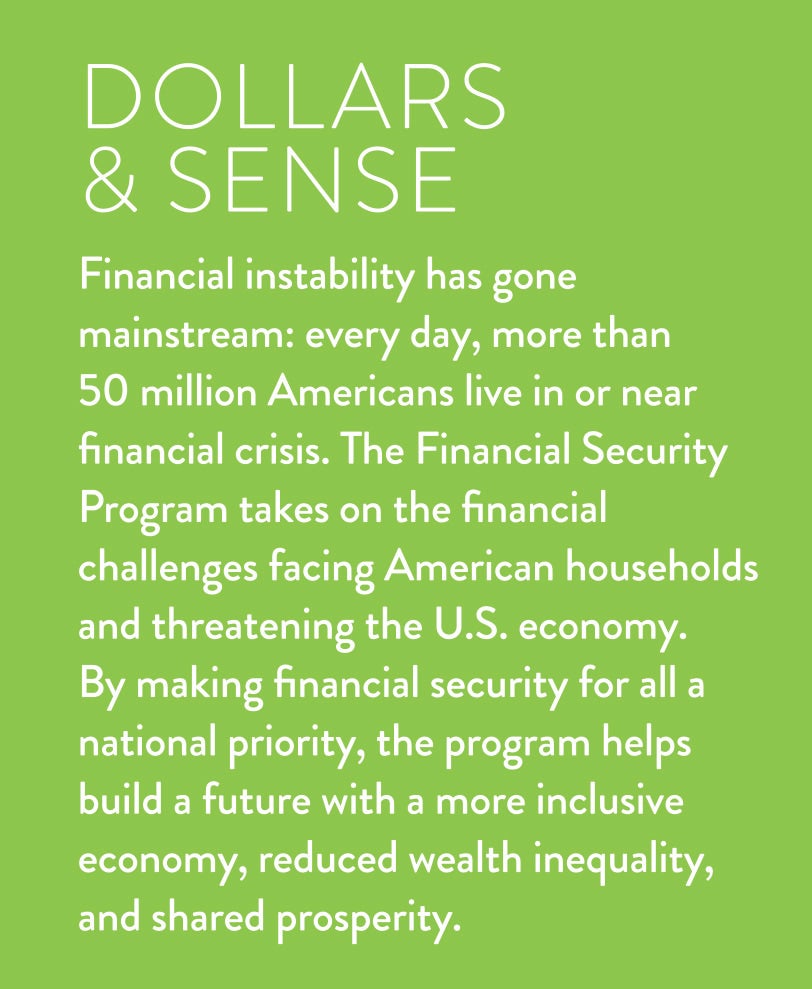 The initiative also helped lead a coalition that created a Small Business Borrowers Bill of Rights, which lays out a set of principles and lending practices such as transparency in pricing, equal credit access, and responsible underwriting. In the last four years, more than 60 lenders and brokers have signed on, and more than 30 organizations, including the National League of Cities, have endorsed it. The coalition also developed a similar set of state and federal policy recommendations, inspiring a pioneering commercial-financing disclosure law in California.
The initiative also helped lead a coalition that created a Small Business Borrowers Bill of Rights, which lays out a set of principles and lending practices such as transparency in pricing, equal credit access, and responsible underwriting. In the last four years, more than 60 lenders and brokers have signed on, and more than 30 organizations, including the National League of Cities, have endorsed it. The coalition also developed a similar set of state and federal policy recommendations, inspiring a pioneering commercial-financing disclosure law in California.
Just as important as bolstering small businesses is encouraging high-quality jobs. The Economic Opportunities Program does this through its Job Quality Fellowship, which supports business leaders dedicated to expanding the availability of better jobs. Since becoming a fellow, J.D. La Rock, the CEO of the Massachusetts Commonwealth Corporation, has made job-quality principles a top priority. His agency gave the Rail Trail Flatbread Company in Hudson, Massachusetts, a grant to develop staff skills and offer career advancement. It made a huge impact: employee incentives totaled $137,000, five employees became salaried managers, and the number of overall Rail Trail jobs rose by 14 percent. La Rock and another Massachusetts fellow, Anjali Sakaria, then at the Federal Reserve Bank of Boston, worked with Governor Charlie Baker’s administration to embrace job-quality initiatives across the state’s workforce development agency.
LEADERSHIP
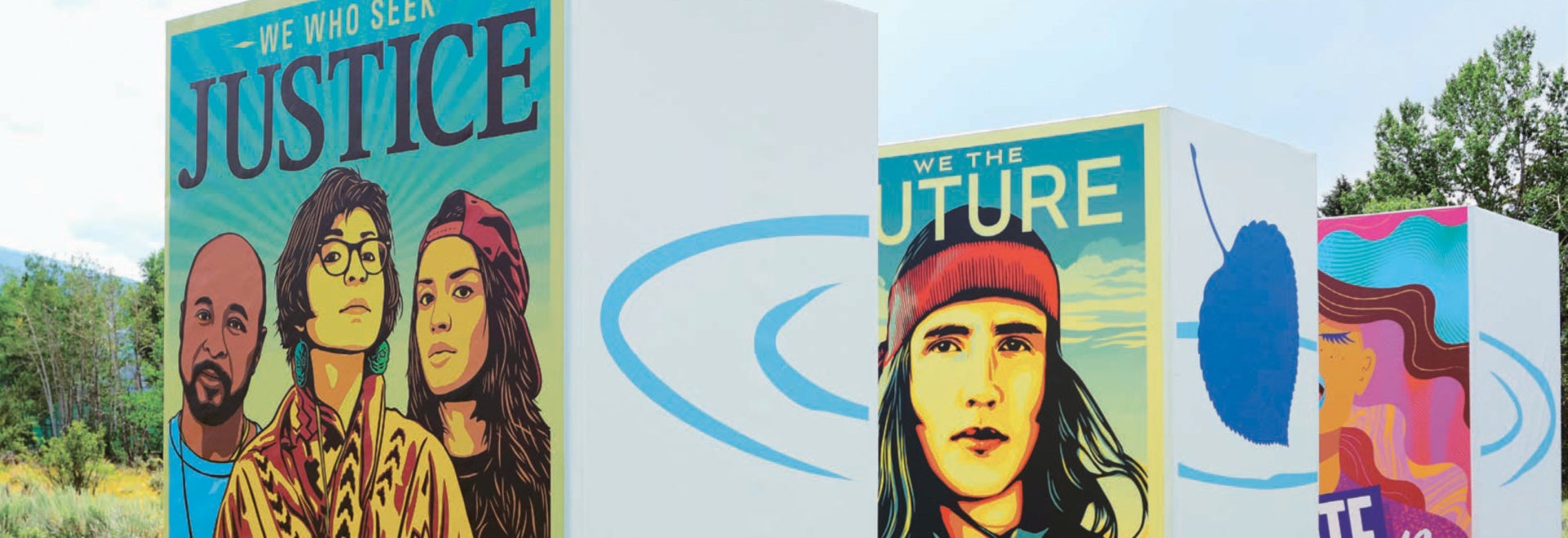
BEING THE CHANGE
The Aspen Global Leadership Network is a worldwide community of entrepreneurial leaders committed to creating a more just, fair, and equitable society. Fellows in the network, numbering more than 3,000 in 50 countries and growing, are challenged to put their passions, talents, and resources to work in helping to solve a societal challenge by launching a social impact venture and by making public commitments—action pledges—at the Resnick Aspen Action Forum.
SUCCESS AT SCALE
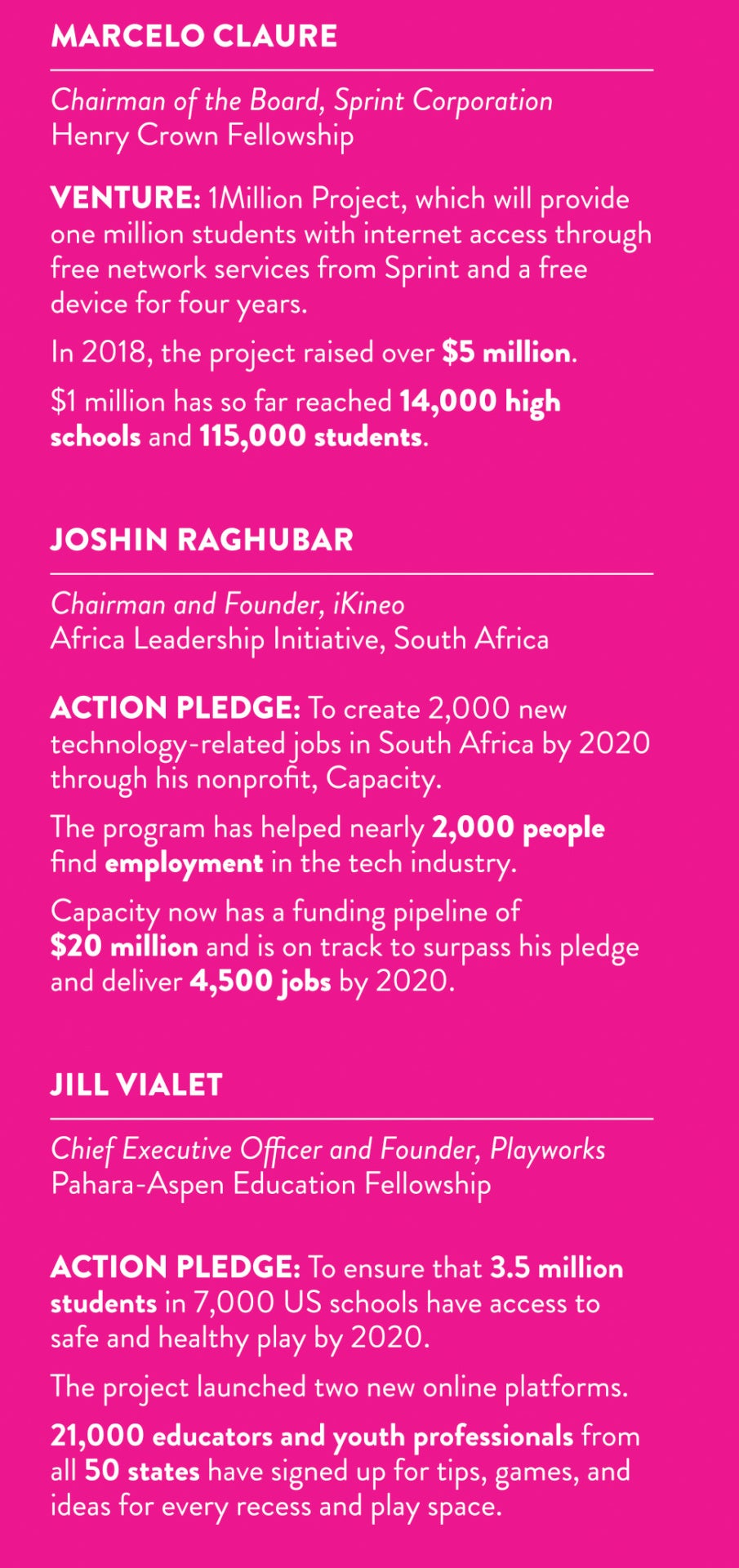 How do you bring social impact to scale? Find people working on similar challenges and connect them to the resources necessary to fuel their solutions. Aspen Global Leadership Network fellows can scale up their impact through several special initiatives.
How do you bring social impact to scale? Find people working on similar challenges and connect them to the resources necessary to fuel their solutions. Aspen Global Leadership Network fellows can scale up their impact through several special initiatives.
The John P. McNulty Prize, awarded annually in partnership with the Institute, recognizes exceptional fellowship ventures. Laureates receive financial support, communications assistance, and professional coaching, and the winner receives a $100,000 award.
Since winning the inaugural McNulty prize in 2008, Jordan Kassalow has radically scaled his venture VisionSpring, a global social enterprise that provides eyeglasses and eye care services in the developing world. “Our reach was 50,000 people 10 years ago,” he says. ”This year it will be 1.4 million. Winning enabled me to create a powerful partnership-based model in Bangladesh which has scaled out to over 20 countries in Asia, Africa, and Latin America.”
The Braddock Scholars Program, now in its third year, helps Aspen Global Leadership Network fellows learn to solve the challenges that come with scaling. For the fellows, this means committing to monthly meetings with Institute trustees and mentors, preparing 9uarterly memos on their progress, and receiving up to $25,000 in grant funding for their initiatives.
Braddock scholar Aimee Eubanks Davis, the founder and CEO of Braven, which helps underrepresented college students get strong first jobs, says the program “has been one of the most catalytic experiences for both my personal development and for Braven as an organization.” Institute board member and business executive Rick Braddock chose Davis to participate in the inaugural 2015 cohort of his namesake program and mentored her himself. Braddock connected Braven with financial-services behemoth Prudential as an employer partner in Newark, New Jersey. As of 2017, Braven has grown from just 14 students in its pilot program to more than 745 students at San Jose State University in California and Rutgers University in New Jersey. Davis says the Braddock Scholars Program’s “mentorship, insights, support, and encouragement have greatly advanced Braven’s strategic path forward.”
Trustee mentors and mentees echo her. Here are just a few on their Braddock Scholars Program experience:
“I’ve never looked at other people’s businesses in the depth I did for the Braddock program. I was able to listen to their ideas for moving into new areas and say, ‘Here are some problems to look at from my own experience.’ Not that my suggestions were definitive—these people were pretty solid. But it was good to get someone else to say ‘Hey, this is your issue. You’d better take a hard look at that.’ And they now have a view toward making a profit.”
—Stewart Resnick, Co-founder, The Wonderful Company
“The Braddock program was like having a board of directors meeting twice a year and a fellowship meeting at the same time. The main theme that came out of my experience is: think bigger.”
—David Williams, Founder and CEO, Core3
PUBLIC PROGRAMS
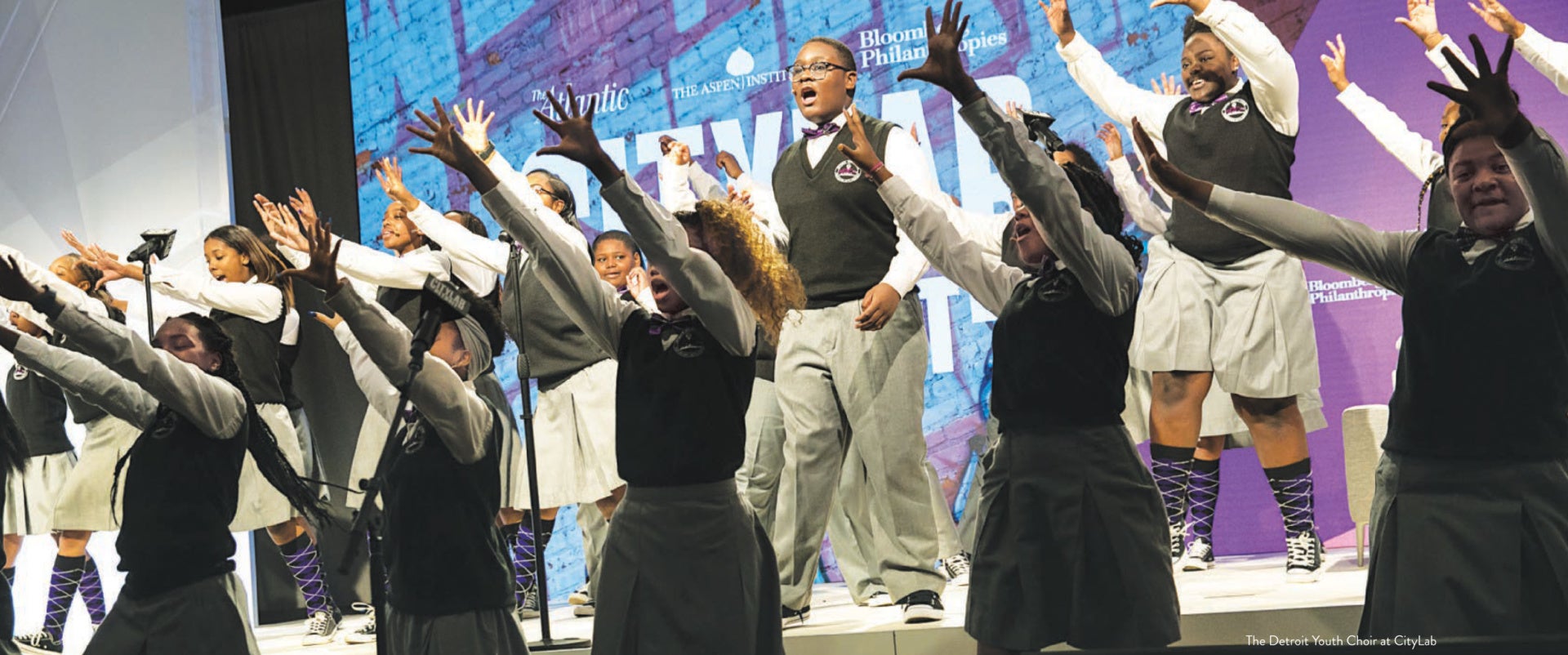
FROM THE ASPEN STAGE
The Institute’s public programs allow our thoughtful, nonpartisan inquiries to reach a wider audience. From the larger-than-life Aspen Ideas Festival to intimate Arts Program roundtables, attendees deeply engage in conversations that touch all parts of society.
CITY LIGHTS
Citylab, an influential summit on urban life, explores topics like gentrification, climate, housing, infrastructure, and arts-and asks how cities can improve. In 2018, Citylab went to Detroit, a city whose dramatic story captures the industrial revolution, the automobile’s golden age, and a new wave of start-ups-as well as persistent inequality and financial distress.
“One Citylab workshop, Rethinking Accessibility, examined public spaces. I used to think barrier-free entrances and stair-free presentation rooms guaranteed accessibility. Not so. ‘Wheelchair-friendly’ does not mean totally inclusive. Those with hearing or visual disabilities also need access to exhibitions-especially with the vast array of solutions technology offers. After Citylab, I am using universal design at work, so we can serve all.”
—Adam Svejda, Co-Founder, Center for Architecture and Metropolitan Planning, Prague, Czech Republic
When seven former FDA commissioners declared from the Spotlight Health 2016 stage that the FDA should be an independent agency, the lnstitute’s Health, Medicine and Society Program staff knew that news was being made. But this consensus was far from a fully fleshed-out idea: no one really knew how an independent agency might work. Then the Laura and John Arnold Foundation expressed interest in funding Health, Medicine and Society to help the commissioners develop the concept.
After two years of research, the program produced a white paper that provided the basis for a Health Affairs editorial written by the commissioners advancing the idea. In the immediate future, they noted, the negotiations and legislation re9uired to move the FDA out of the
US Department of Health and Human Services make separation unlikely. But they proposed interim steps that would allow the FDA to operate more efficiently. As significant, all seven are on record as favoring independence. It is a landmark recommendation-one that started on the lnstitute’s stage.
THE PEN IS MIGHTIER
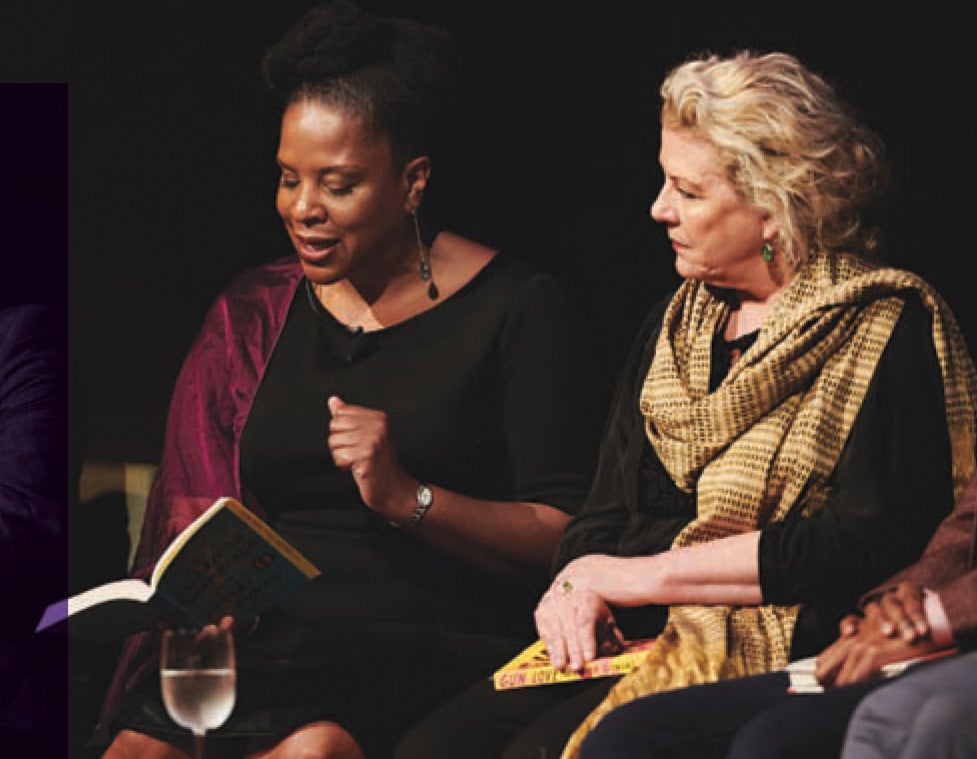 In 2018, Aspen Words established a new literary prize to honor a work of fiction that illuminates a contemporary issue. The $35,000 award, endowed in perpetuity by an anonymous donor, is one of the largest literary prizes in the United States and one of the few focused on fiction with social impact. Eligible works must be novels or short-story collections published in English that address questions of violence, inequality, gender, the environment, immigration, religion, race, and other issues. Judges look for books that not only engage social issues but are also beautifully rendered. The winner of the inaugural prize was Mohsin Hamid for Exit West, a novel that draws readers into the lives of modern refugees; in 2019, the prize was awarded to Tayari Jones for An American Marriage. Beneath the surface of this deeply moving love story, Jones wove a powerful statement about a corrupt criminal justice system that has ravaged generations of African American families.
In 2018, Aspen Words established a new literary prize to honor a work of fiction that illuminates a contemporary issue. The $35,000 award, endowed in perpetuity by an anonymous donor, is one of the largest literary prizes in the United States and one of the few focused on fiction with social impact. Eligible works must be novels or short-story collections published in English that address questions of violence, inequality, gender, the environment, immigration, religion, race, and other issues. Judges look for books that not only engage social issues but are also beautifully rendered. The winner of the inaugural prize was Mohsin Hamid for Exit West, a novel that draws readers into the lives of modern refugees; in 2019, the prize was awarded to Tayari Jones for An American Marriage. Beneath the surface of this deeply moving love story, Jones wove a powerful statement about a corrupt criminal justice system that has ravaged generations of African American families.
Thank you to Aspen Words for this award. So many of us who want to write and engage the issues of the day are encouraged not to. We’re told that that’s not what real art does. This award encourages all of us to keep following the strength of our convictions.”
—Tayari Jones, Author and winner of the 2019 Aspen Words Literary Prize
HOW TO MEASURE IMPACT
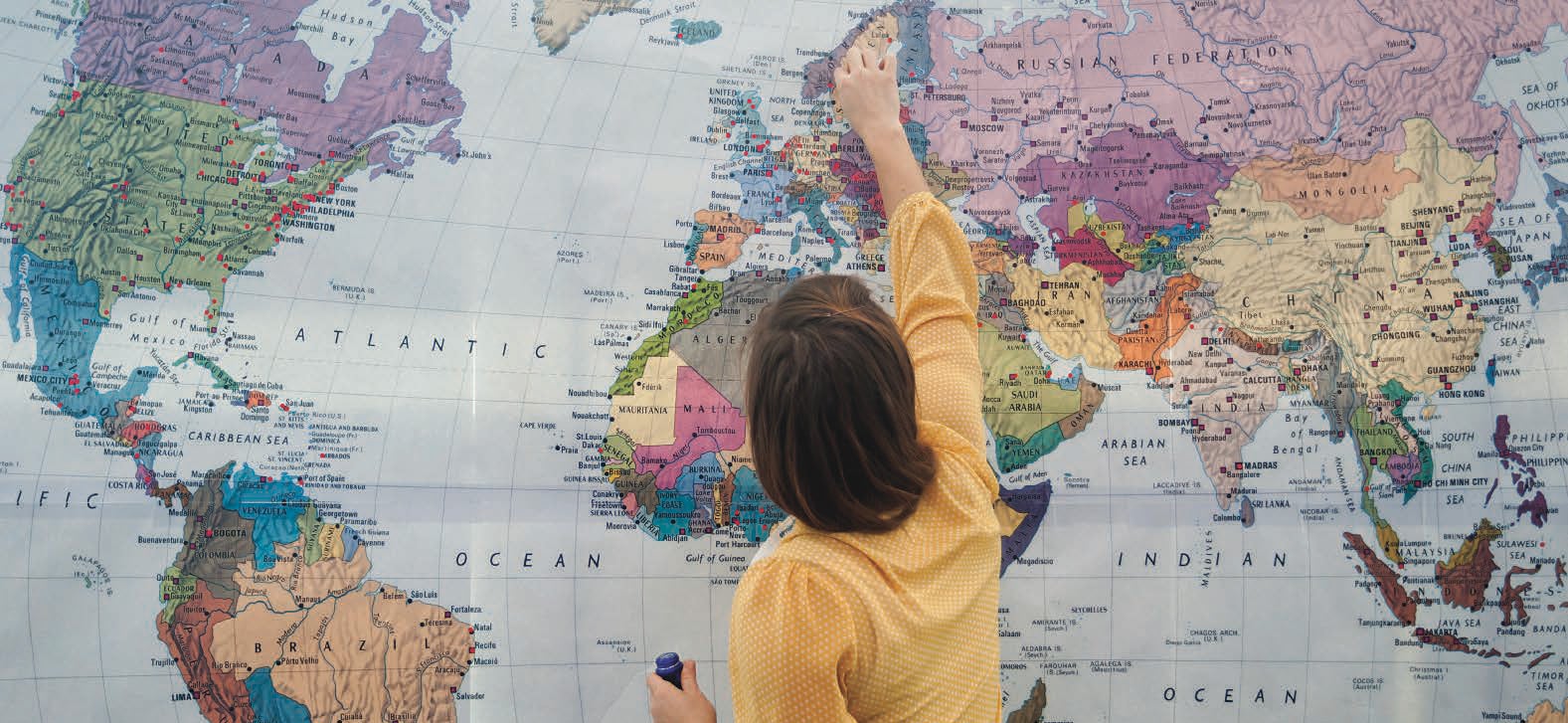
HOW DID WE DO?
David Devlin-Foltz
Over my 25 years with the Institute, I have had several jobs, mainly as part of policy programs that address daunting long-term challenges: climate change, access to family planning, promoting women’s and girls’ rights. I’d like to think that we were making a difference. But for years, nobody really asked. Then that changed. People started asking. Funders wanted to know the return on their investments in promoting social change. And so did the activists and advocates we collaborated with. It’s natural: people want to know that their work is meaningful.
For the past 10 years, I have led evaluation efforts for external clients like the William and Flora Hewlett Foundation, the Bill and Melinda Gates Foundation, CARE, and many others. Our team developed and refined tools to help answer persistent questions about what makes a difference—and what difference it makes. We can use interviews, focus groups, surveys, and other standard (and some quite innovative) evaluation tools to identify the possible ways that clients contribute to possible outcome-changed attitudes about child marriage among youth and parents in rural Bangladesh, say, or among key congressional staff in Washington, DC.
But at times, the Aspen Planning and Evaluation Program must tell clients and colleagues why we can’t answer those questions. The data aren’t good; there is too much noise and not enough signal. Or we can’t say for certain what else might have made those outcomes occur. Complex social problems and systems don’t yield nice statements like: ‘½. made B happen.”
We can’t offer a randomized control trial that eliminates every other possible cause for B. And operating in a complex system doesn’t offer nice, neat return-on-investment calculations. That is, we can’t tell you exactly what part of B that A accomplished per dollar spent. That is frustrating but truthful.
So I look at the Institute’s work with the gimlet eyes of a professionally skeptical evaluator, but also with the affectionate regard of a 25-year employee who believes in the ideals of the Institute-and in its potential to create positive change in individuals and society.
As you review this collection of impact statements, I invite you to maintain a similar perspective: affectionate, skeptical, and realistic. My colleagues may not be able to answer the “so what?” question every time with satisfying rigor and clarity. For good reason: like our external clients, my Aspen colleagues work on complex social problems. Dialogue opens minds, but it can also spark actions that may occur years later. Research may inform policy, but policymakers may be reluctant to admit what influenced them. Any one actor-and any one Aspen program—can try to track its contributions to change. But claiming, “We made this happen all by ourselves,” is usually a mistake.
Nonetheless, the Institute can and does do a lot to map our contributions to making the Good Society we envision. At our best, our policy, leadership, and public programs enable change by creating the conditions under which change can happen. But at our best, we are also smart enough to be humble.
YOUTH PROGRAMS
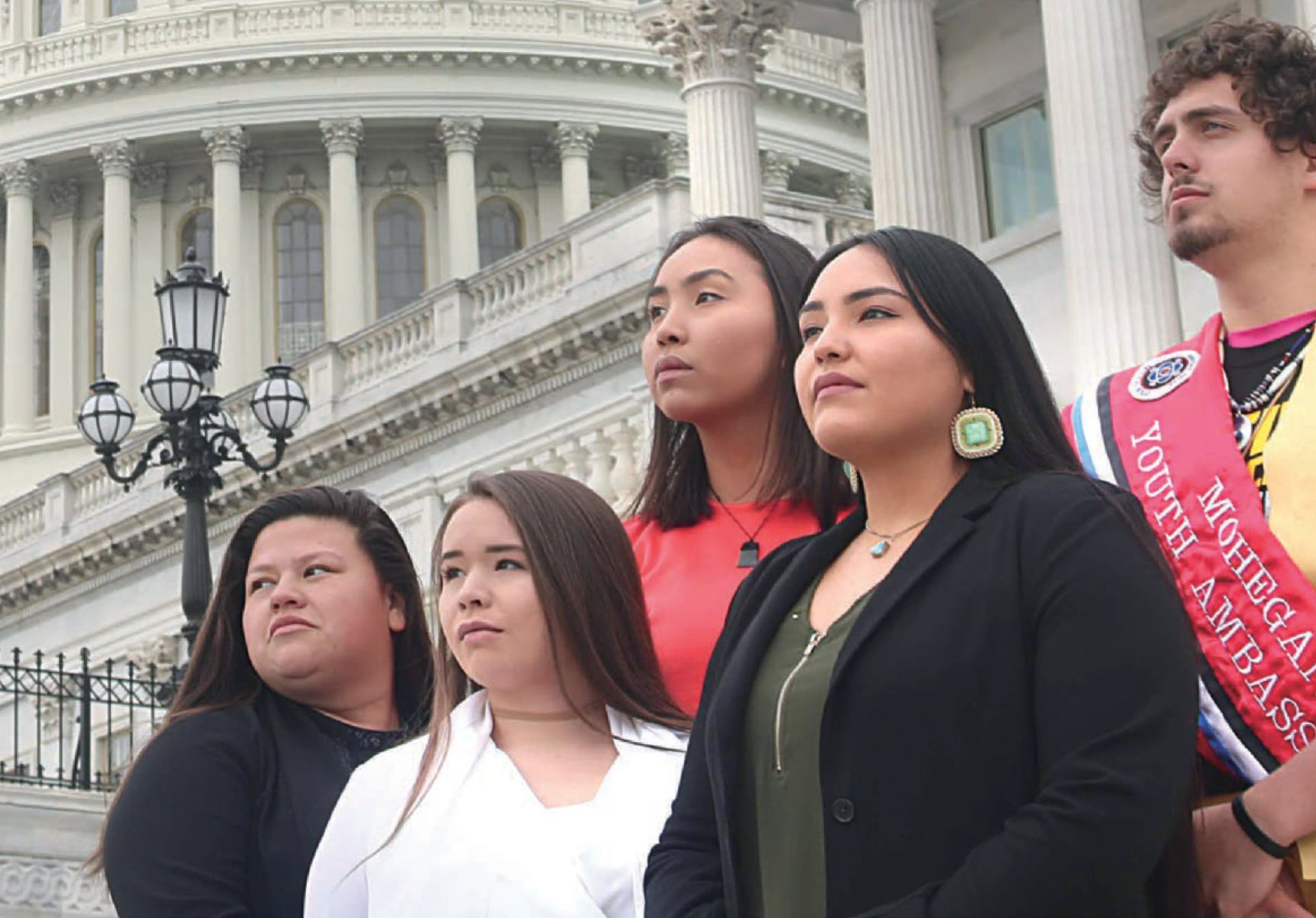
YOUNG & RESTLESS
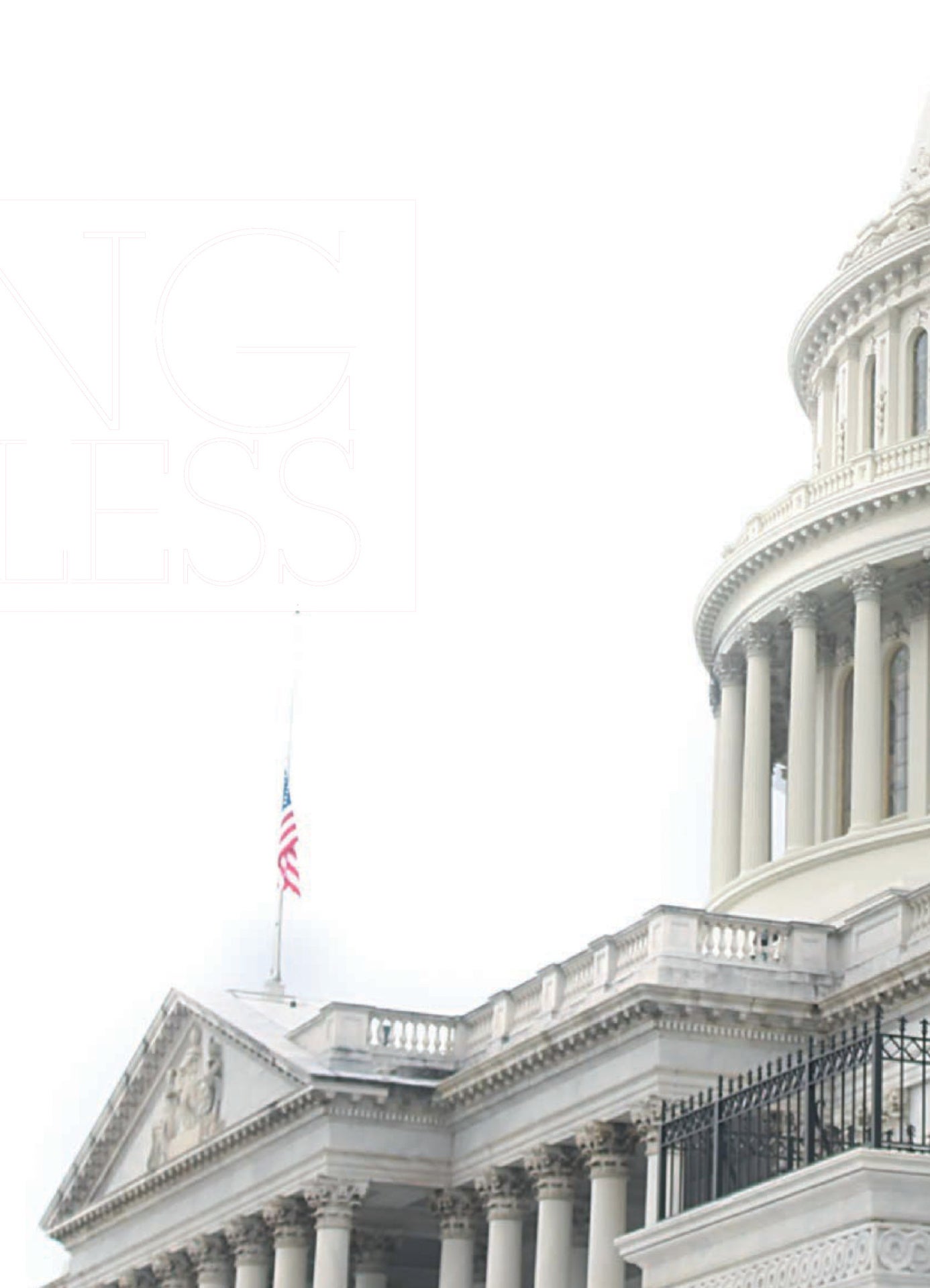 The Institute’s newest cadre of leaders has seen what happens when people wait to address problems—and they aren’t willing to do the same. They’re impatient for a revolution. “I realized that to change the world, we must keep moving forward,” says Jacob Urbina, an alumnus of the Bezos Scholars Program. Our youth programs focus on the next generation by working directly in urban, rural, and tribal communities to develop leadership skills and activate civic engagement. Together they are empowering young people to make their mark.
The Institute’s newest cadre of leaders has seen what happens when people wait to address problems—and they aren’t willing to do the same. They’re impatient for a revolution. “I realized that to change the world, we must keep moving forward,” says Jacob Urbina, an alumnus of the Bezos Scholars Program. Our youth programs focus on the next generation by working directly in urban, rural, and tribal communities to develop leadership skills and activate civic engagement. Together they are empowering young people to make their mark.
TO BE YOUNG, NATIVE, & EMPOWERED
The Center for Native American Youth is dedicated to improving the lives of young people across Indian Country. Through a variety of initiatives, CNAY helps young Natives lead full and healthy lives, have equal access to opportunity, and draw strength from their culture and one another.
“CNAY has not only been a resource and outlet, they have become like a family. Since our first interactions, they have helped me grow professionally and educationally. They have become an outlet and a resource for myself and others. Our messages are all different, but CNAY has managed to tend to all of Native youth needs.”
—Nancy Deere-Turney, Member, Muscogee (Creek) Nation CNAY Youth Advisory Board Vice President
BACK TO SCHOOL, BACK TO WORK
 Born out of a White House initiative, the lnstitute’s Forum for Community Solutions challenges and encourages local groups and leaders to create a more equitable and just world. In 2012, the program launched its biggest project yet: the Opportunity Youth Forum, a national collaborative of communities, funders, and local organizations dedicated to bringing young adults back to school or into the workforce. This collaborative encompasses 1.2 million “opportunity youth” across the United States. In 2018, the Opportunity Youth Forum received remarkable results from an independent three-year evaluation of its work.
Born out of a White House initiative, the lnstitute’s Forum for Community Solutions challenges and encourages local groups and leaders to create a more equitable and just world. In 2012, the program launched its biggest project yet: the Opportunity Youth Forum, a national collaborative of communities, funders, and local organizations dedicated to bringing young adults back to school or into the workforce. This collaborative encompasses 1.2 million “opportunity youth” across the United States. In 2018, the Opportunity Youth Forum received remarkable results from an independent three-year evaluation of its work.
Within the internet’s borderless spaces, young people can find connections outside their local communities and can even tackle challenges on the other side of the planet. In other words, technology is changing the way young people engage with the world and is inspiring a sense of global citizenship. Yet unmediated online connections have the potential to fuel misunderstanding and division.
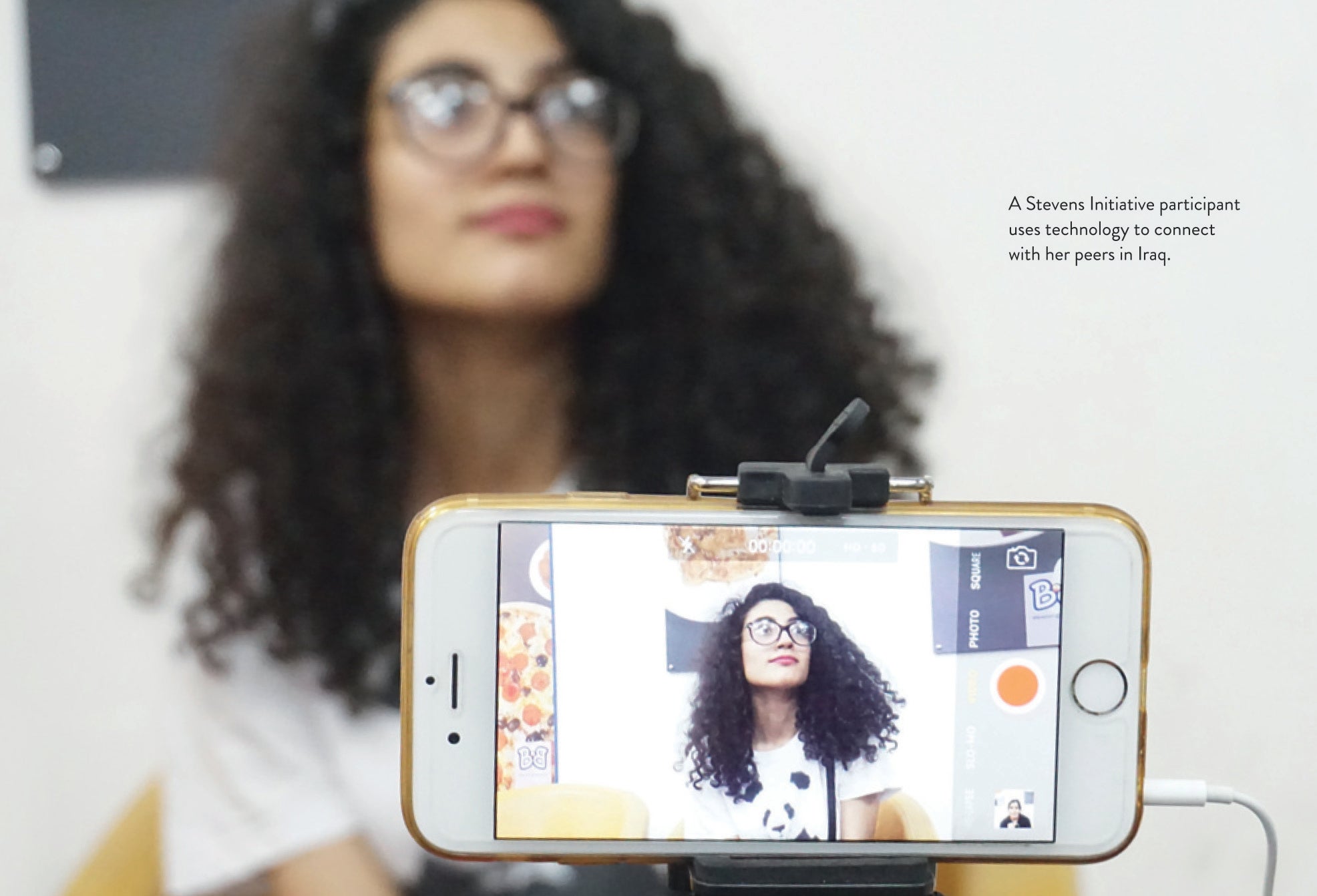 To ensure that global connectivity leads to a safer and more prosperous world, the Stevens Initiative promotes personal interactions among youth through virtual exchange programs. With the addition of its newest programs, the Stevens Initiative will expand its reach to nearly 40,000 students in 15 Middle Eastern and North African countries and in the Palestinian Territories, as well as in 44 US states, Puerto Rico, and Washington, DC. The idea is to equip young people with the language proficiency, digital literacy, and cross-cultural communication skills they will need for a globalized future.
To ensure that global connectivity leads to a safer and more prosperous world, the Stevens Initiative promotes personal interactions among youth through virtual exchange programs. With the addition of its newest programs, the Stevens Initiative will expand its reach to nearly 40,000 students in 15 Middle Eastern and North African countries and in the Palestinian Territories, as well as in 44 US states, Puerto Rico, and Washington, DC. The idea is to equip young people with the language proficiency, digital literacy, and cross-cultural communication skills they will need for a globalized future.
The virtual exchange was amazing because for the first time I worked with people from a different country. My partners in Iowa taught me lots of things about their culture and our commonality. We are the same, we are all humans.”
—Stevens Initiative participant, Jordan
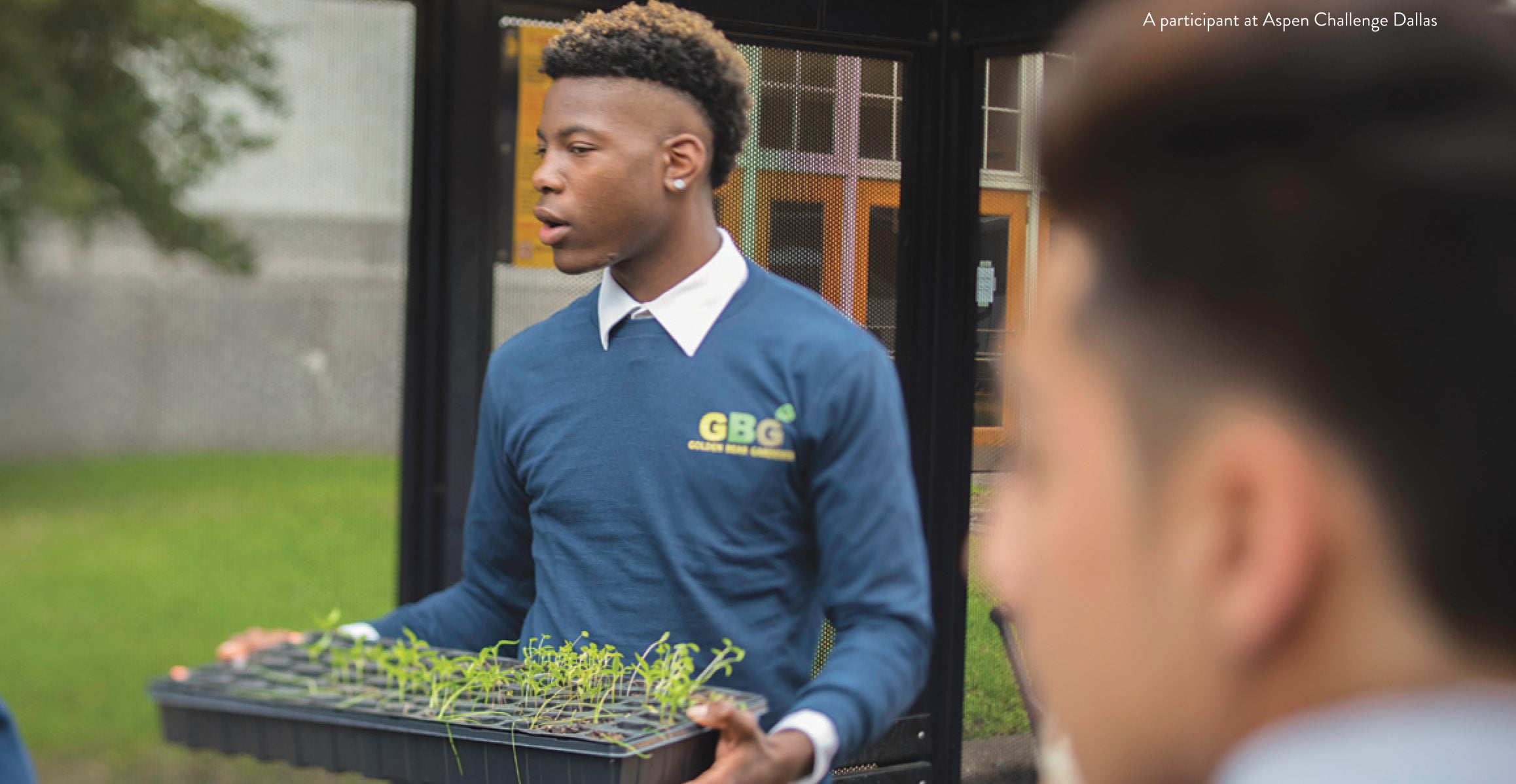
Since 2013, the Aspen Challenge has served over 2,000 youth, 500 teachers, and dozens of community partners in seven US cities: Los Angeles, Denver, Washington, Chicago, Philadelphia, Dallas, and Louisville. What does that mean? It’s different in every city, but the impact is clear, consistent, and profound. Teams of eight students and two educators focus on issues like urban ecology, economic mobility, relationships with police, or immigration. Gains realized during this eight-week competition compare to or exceed those of a full year of college.
In Philadelphia, the student leaders at PhitPhilly addressed health disparities and brought sustainable changes in health to their community. As the flagship city for the larger UrbanPhit initiative, which is designed to deliver better health to metro areas, health care expert Dr. Ezekiel Emanuel challenged students throughout Philadelphia to improve the overall health of people of all ages in their neighborhoods. “We won the competition by creating a class for elementary and high school students and their parents,” Juan Rivera, a rising junior from PhitPhilly, says, “that focused on healthy eating, organizing community events to promote physical activity, and developing a downloadable app to help residents achieve their health goals.”
Since the competition, UrbanPhit has received over 2,000 downloads from various countries. The app includes links to healthy-eating cookbooks and recipes, exercise regimens for all fitness levels, mental health data, and other valuable information. “Spreading the message of health and a balanced lifestyle made us healthier in the process,” Kailah McFadden, a graduating senior, says. “Even when many of us go to college next year, we will have a lifelong commitment to serving our community-and staying healthy.”
ASPEN AROUND THE WORLD
FROM POVERTY TO PROSPERITY
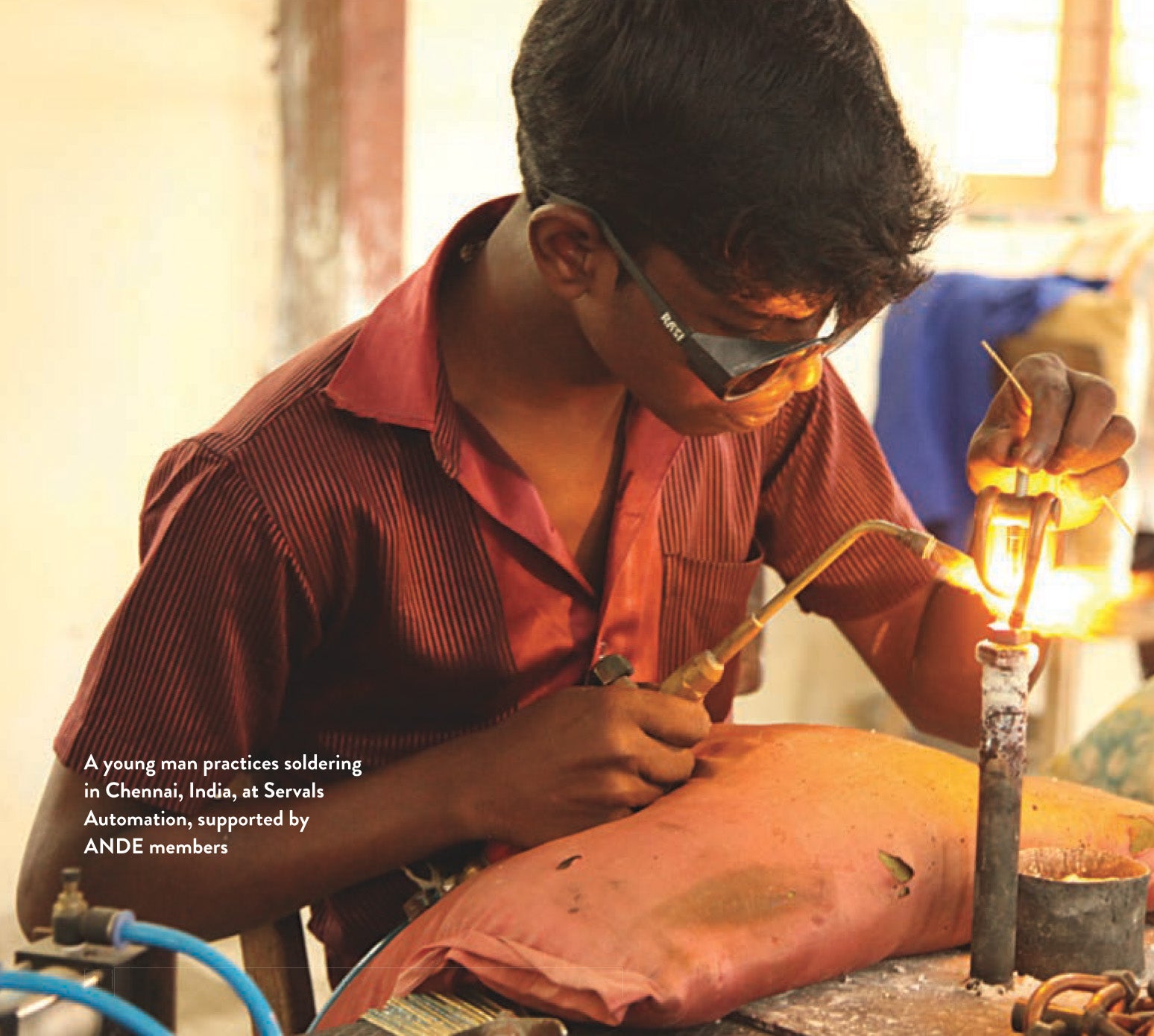 Entrepreneurs are known for building something out of nothing—for identifying gaps in products and ideas and creating something to fill those spaces. For a time, microfinancing was seen as the solution to household poverty in the developing world. But there were few systems in place to support the next level of businesses—those that have the potential to lift communities, not just families, out of poverty. Small businesses that hoped to move beyond just a few jobs struggled to grow. In 2009, a group of leaders with a mix of private-and public-sector experience came together at the Institute to address that gap and improve the entrepreneurial landscape in developing countries. The Aspen Network of Development Entrepreneurs was born.
Entrepreneurs are known for building something out of nothing—for identifying gaps in products and ideas and creating something to fill those spaces. For a time, microfinancing was seen as the solution to household poverty in the developing world. But there were few systems in place to support the next level of businesses—those that have the potential to lift communities, not just families, out of poverty. Small businesses that hoped to move beyond just a few jobs struggled to grow. In 2009, a group of leaders with a mix of private-and public-sector experience came together at the Institute to address that gap and improve the entrepreneurial landscape in developing countries. The Aspen Network of Development Entrepreneurs was born.

ANDE was formed to help investment funds, business accelerators, foundations, and training institutions accelerate the work of growth-focused entrepreneurs in emerging markets. Since its launch, ANDE has grown from a membership base of 34 organizations to nearly 300. It has launched regional offices in eight countries, providing in-person opportunities for local entrepreneurs and generate collective insights. And ANDE has generated more than $7 million in philanthropic support to solve challenges specific to the small and growing business sector in emerging market countries—including how to access financing, attract and retain talent, improve gender equity, and measure social and environmental impact.
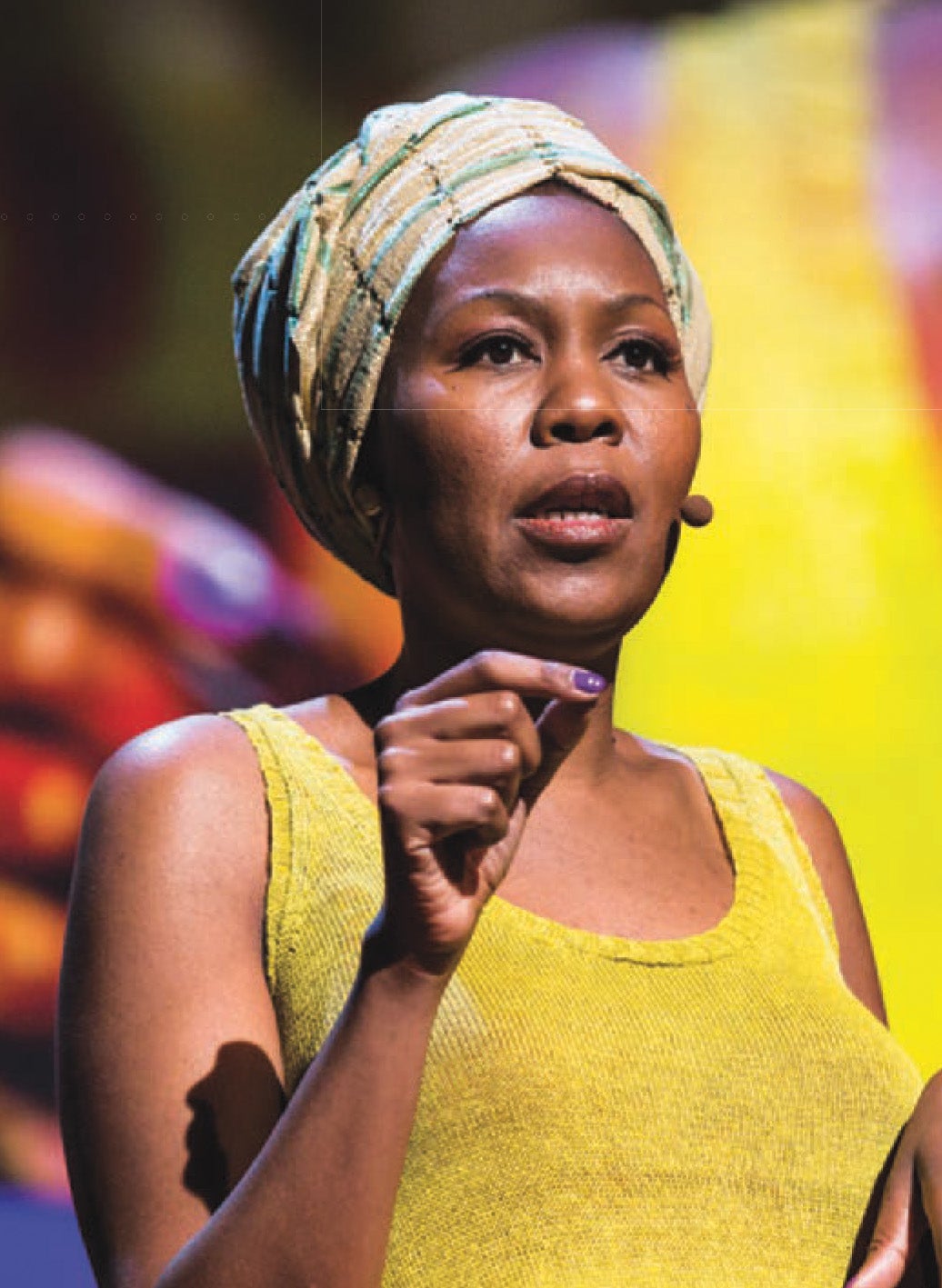 The Aspen Global Innovators Group addresses overlooked challenges in global health and development. The group engages a diverse, global network to identify and promote new leaders and solutions that advance health, equality, and prosperity for all. Each year, it hosts two fellowship programs that amplify the voices of emerging leaders working in the United States and across the globe—the New Voices Fellowship and the Healthy Communities Fellowship.
The Aspen Global Innovators Group addresses overlooked challenges in global health and development. The group engages a diverse, global network to identify and promote new leaders and solutions that advance health, equality, and prosperity for all. Each year, it hosts two fellowship programs that amplify the voices of emerging leaders working in the United States and across the globe—the New Voices Fellowship and the Healthy Communities Fellowship.
The New Voices Fellowship includes a diverse group of thinkers and doers who are tackling food security, universal health care, human trafficking, and reproductive rights. Through a yearlong mentorship program, coupled with intensive communications and advocacy training, fellows learn to showcase their own life experiences, research, and on-the-ground expertise. The group has secured more than 2,500 media placements, including The New York Times, NPR, the BBC, and TED.
Launched in 2019, the Healthy Communities Fellowship builds upon the mentorship, communications, and advocacy curriculum of the New Voices Fellowship, and focuses on US-based community leaders addressing the social determinants of health. The inaugural class—which is taking on issues ranging from criminal justice to maternal care—is learning to use storytelling to advocate for health outside the doctor’s office.
EDUCATION & FAMILIES
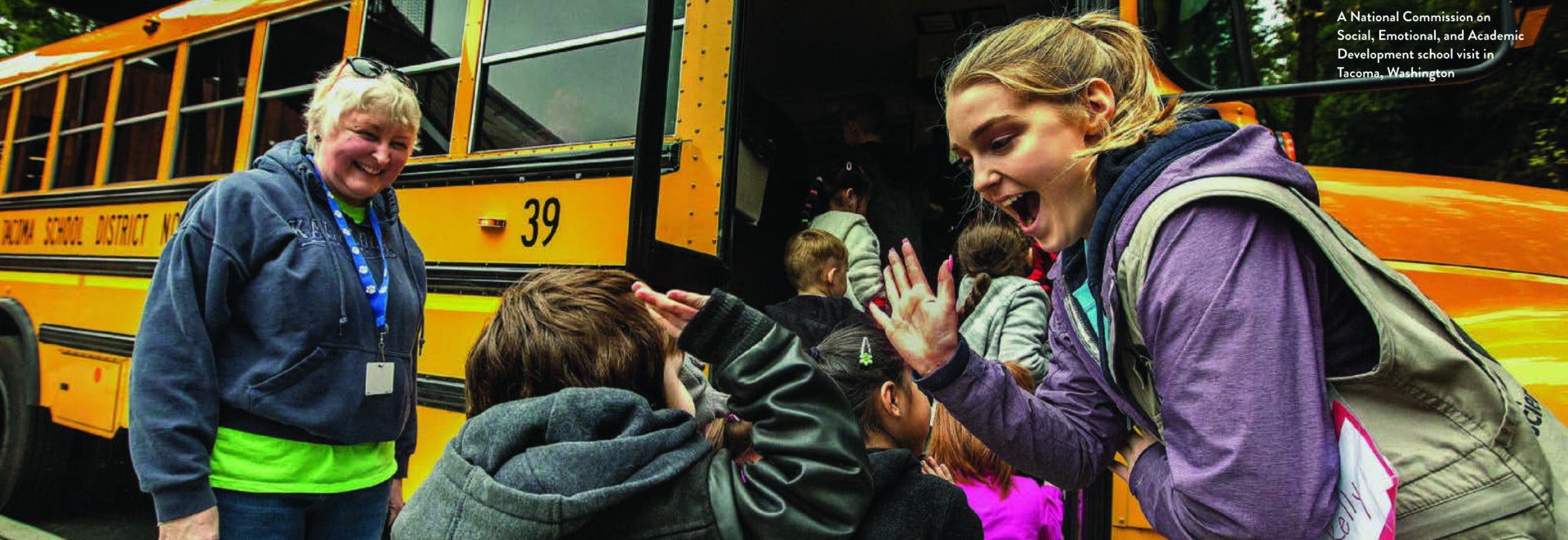
THE BUILDING BLOCKS OF LIFE
With the right tools, great leaders can do incredible things. But first they start as children. Children all over the world over need a few basic building blocks for life: a good education, good health, and good opportunities that led them use their knowledge.
FAMILY PROSPERITY
The Institute’s Ascend program takes a two-generation approach to ending intergenerational poverty in families. As the national hub for moving children and families to educational success, economic security, and health, Ascend invests in fellowship programs, drives change through a network of 323 organizations, and fuels new approaches to national, state, and local policy for families.
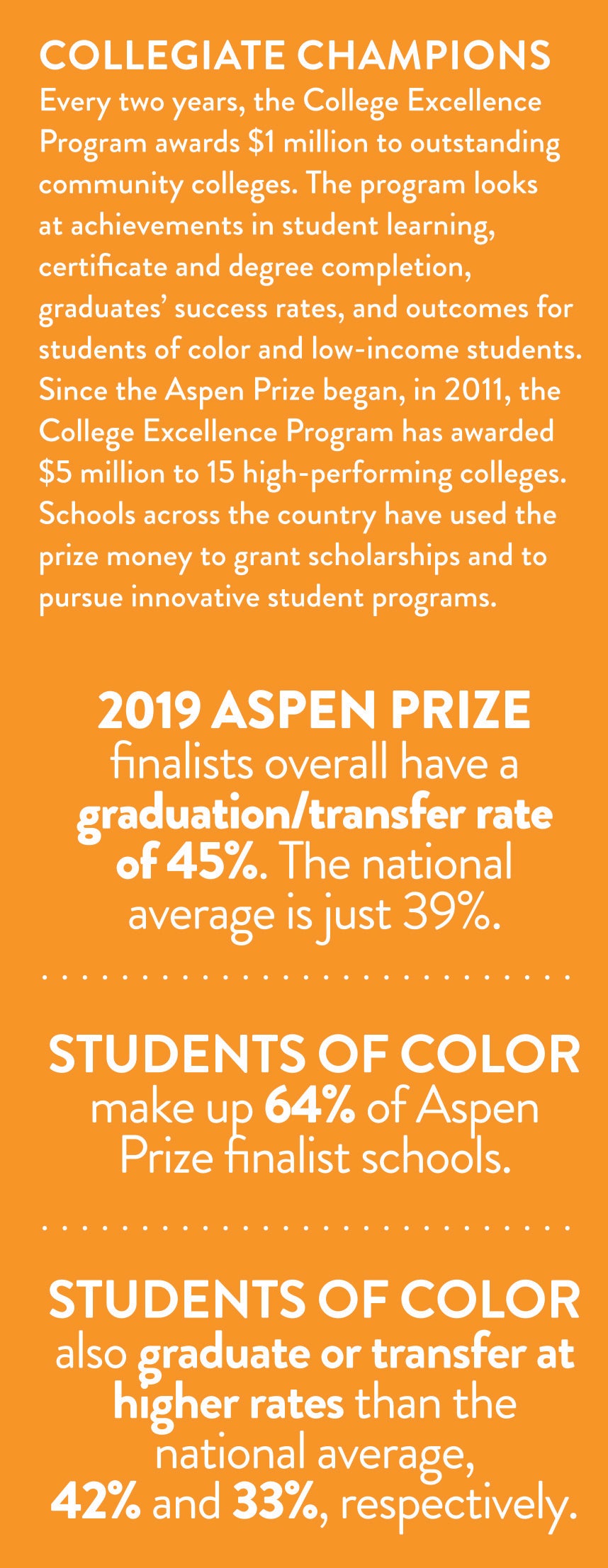 Equity is central to the mission of public education, and equity is public education’s defining challenge. In 2016, the Education and Society Program worked with state education leaders to develop specific commitments for leaders to advance equity. Drawing on interviews with over 60 leaders, the Institute convened a workshop of unprecedented diversity and distinction: Republican and Democratic state legislators and governors’ education advisors, three state superintendents, two Teachers of the Year, senior school district leaders, civil rights advocates, scholars, and philanthropy leaders. Half of the participants were people of color. The goal was intimate, off-the-record discussions that would develop public commitments to advance equity.
Equity is central to the mission of public education, and equity is public education’s defining challenge. In 2016, the Education and Society Program worked with state education leaders to develop specific commitments for leaders to advance equity. Drawing on interviews with over 60 leaders, the Institute convened a workshop of unprecedented diversity and distinction: Republican and Democratic state legislators and governors’ education advisors, three state superintendents, two Teachers of the Year, senior school district leaders, civil rights advocates, scholars, and philanthropy leaders. Half of the participants were people of color. The goal was intimate, off-the-record discussions that would develop public commitments to advance equity.
From that workshop, the Institute took the lead in drafting Leading for Equity: Opportunities for State Education Chiefs, 10 commitments leaders can act on to create greater equity in education outcomes. The document prompts leaders to identify their most pressing concerns and demonstrates ways to measure progress. Leading for Equity commitments were unanimously adopted by the Council of Chief State School Officers board of directors, embedded throughout that organization’s strategic plan, and publicly released at the lnstitute’s DC headquarters in February 2017. CCSSO hired its first equity director in 2018, and uses the equity commitments to orient and support every new state superintendent.
Tony Evers, the group’s president before successfully running to become the governor of Wisconsin, says: “I would not be doing what I am doing today in the state of Wisconsin with regard to equity were it not for my participation at the Aspen summer meeting on equity.”
THE TWO-GEN APPROACH AT WORK
Elizabeth Scales, a mother of four, didn’t expect to start life over as a single parent. After leaving an abusive relationship, she moved to Tulsa, Oklahoma, to live with family and, through searching for better outcomes for herself and her family, discovered a unique two-generation initiative: CAP Tulsa and its CareerAdvance project. According to Steven Dow, the executive director of CAP Tulsa, Scales enrolled her son in the CAP Tulsa early education program and soon noticed his growth and the new opportunities he had to socialize with other children. Then CareerAdvance helped her find a job that worked with her children’s schedules. Plus, when Scales embarked on a medical-assistant certification, the program provided the support she needed, including coaching and study tips. After completing CareerAdvance, Scales was hired by the clinic where she had completed her training. “CAPT Tulsa really felt like a family,” Scales says. ”The people there cared not only about my son’s success but my own.”
POLITICS
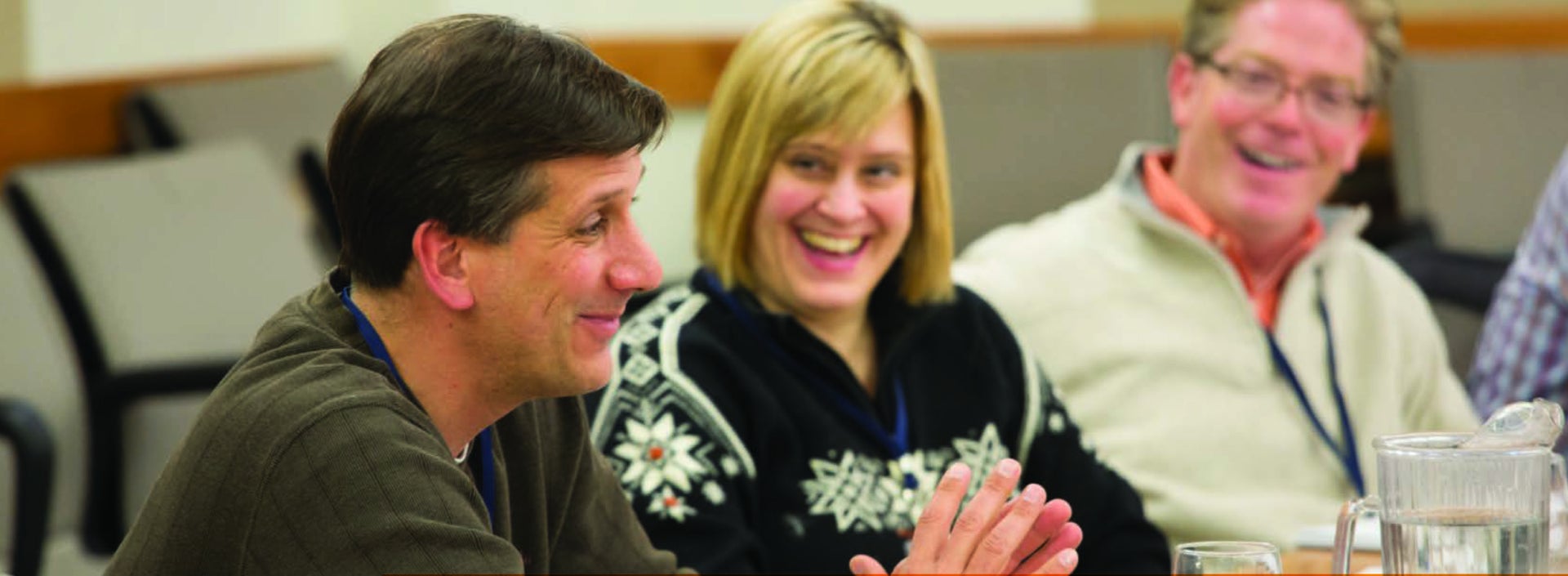
CROSSING THE AISLE
Policy matters. It drives the economy, health care, culture, foreign affairs, criminal justice, and everything in between. To get policy results, US democracy requires rigorous debate—and rigorous compromise. Without common ground, legislators can’t govern or help the Americans who most need their support. Elected leaders must engage across party lines with civility and respect—which is exactly what the Institute provides. Politics and government, from city council to Congress, can be arduous and messy. It can also be bipartisan and transformative.
FRIENDS AND FELLOWS
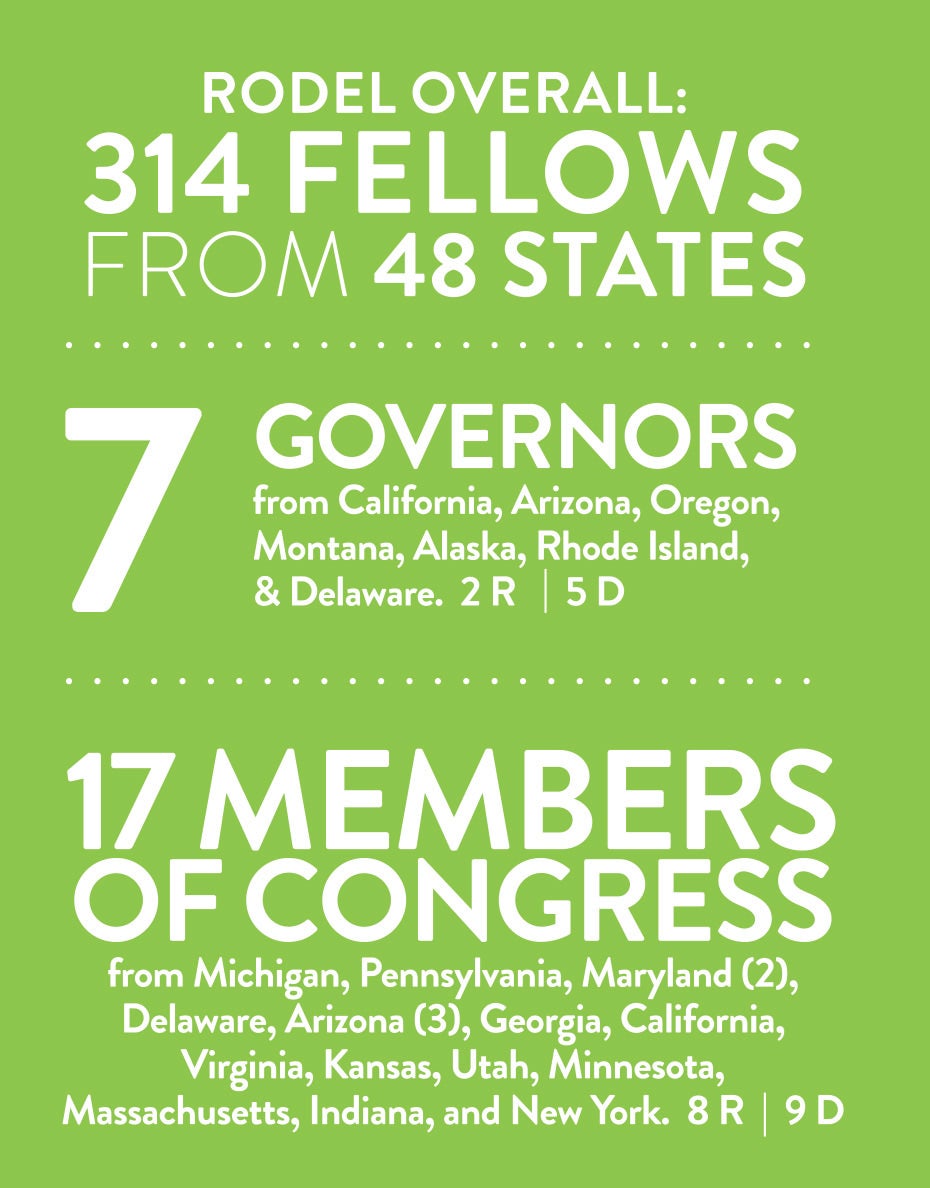 The Rodel Fellowships in Public Leadership program’s strict “leave your party affiliation and ideology at home” approach to closed dialogue has for its 15 years proved extremely successful, with many of Rodel’s young fellows moving on to the nation’s most important public positions: seven as governors, three as Cabinet secretaries, 17 as members of Congress, and dozens of state legislative leaders, attorneys general, and mayors of major American cities. By early summer, four had already entered the next presidential race.
The Rodel Fellowships in Public Leadership program’s strict “leave your party affiliation and ideology at home” approach to closed dialogue has for its 15 years proved extremely successful, with many of Rodel’s young fellows moving on to the nation’s most important public positions: seven as governors, three as Cabinet secretaries, 17 as members of Congress, and dozens of state legislative leaders, attorneys general, and mayors of major American cities. By early summer, four had already entered the next presidential race.
“Serving in a legislature can be very isolating, polarizing, and partisan. The Rodel experience helped remind me that it does not have to be and should not be that way. As public officials, we are under great pressure to stick to the partisan party line. Rodel provides a counterbalance to those pressures.”
—Jon Husted, Republican Lieutenant Governor, Ohio
The program is the invisible link connecting the Republican governor of Arizona and the Democratic governor of California; Georgia Democratic gubernatorial nominee Stacey Abrams and Jon Husted, the Republican lieutenant governor of Ohio; state attorneys general Maura Healey of Massachusetts, Lisa Madigan of Illinois, Bob Ferguson of Washington state, Alan Wilson of South Carolina, and Josh Shapiro of Pennsylvania.
When Florida Democratic gubernatorial nominee Andrew Gillum told a reporter that he could work productively with the Republican legislature, he said that was because of his Rodel relationship with state house speaker Jose Oliva.
GIVE PEACE A CHANCE
The lnstitute’s Congressional Program gives US senators and representatives the opportunity to delve into complex and pressing public-policy issues with internationally recognized experts in a neutral, off-the-record setting. Since the program’s inception, it has engaged 458 members of Congress, including 35 percent of the current Congress, and more than 1,600 international parliamentarians, political leaders, and scholars. In 2015, the Congressional Program hosted a bipartisan delegation of members of Congress at a conference in Tanzania focused on US interests in Africa. During the course of that forum, the delegation met with Peace Corps volunteers who taught at a local school. Upon their return to the United States, the members of that delegation wrote to their congressional colleagues about the impact they had witnessed from the various projects supported by these volunteers and advocated the merits of increasing funding for the Peace Corps. As a direct result, Congress increased the appropriation for the Peace Corps by 15 percent, the organization’s largest yearly increase ever.
SECURITY
SCREEN TIME
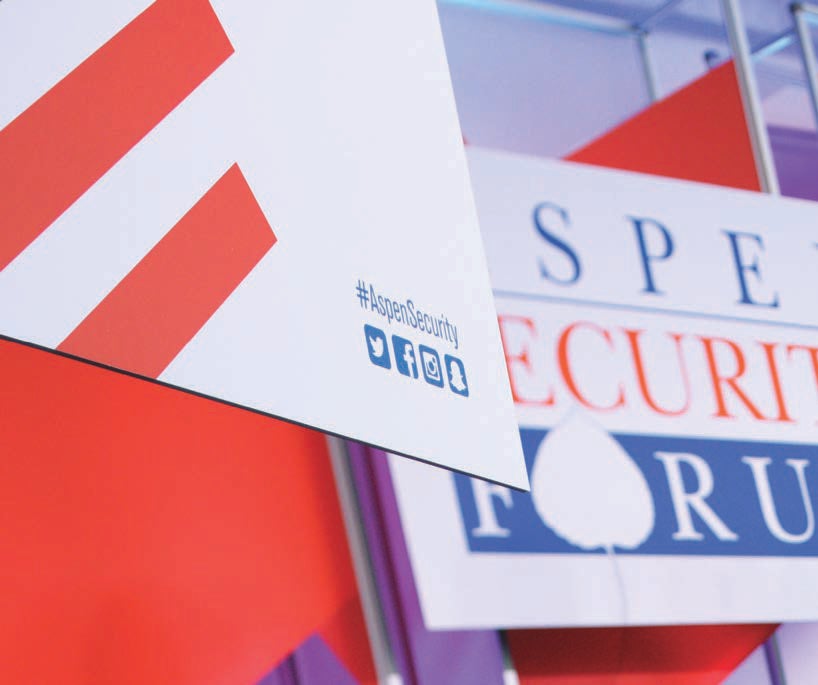 The new age of cybertechnology presents the United States both opportunities and challenges. Just as nuclear weapons were critical to geopolitics and the 20th-century balance of power, so too will the possession and use of cyberweapons shape the 21st century. However, as former Assistant Secretary for Homeland Defense and Global Security Eric Rosenback outlined at an Aspen Strategy Group workshop, cybertechnologies and nuclear weapons are markedly distinct. Nuclear weapons are not subtle, and their origin is always obvious. Any use of nuclear weapons is a devastating attack. But cyberattacks can be misattributed, disguised, scaled, and countered proportionally. Moreover whereas nuclear weapons require the resources of a superpower, cyberweapons are in the arsenal of anyone with access to the internet.
The new age of cybertechnology presents the United States both opportunities and challenges. Just as nuclear weapons were critical to geopolitics and the 20th-century balance of power, so too will the possession and use of cyberweapons shape the 21st century. However, as former Assistant Secretary for Homeland Defense and Global Security Eric Rosenback outlined at an Aspen Strategy Group workshop, cybertechnologies and nuclear weapons are markedly distinct. Nuclear weapons are not subtle, and their origin is always obvious. Any use of nuclear weapons is a devastating attack. But cyberattacks can be misattributed, disguised, scaled, and countered proportionally. Moreover whereas nuclear weapons require the resources of a superpower, cyberweapons are in the arsenal of anyone with access to the internet.
The Institute is actively working on these issues through its quickly growing Cybersecurity & Technology program. Founded just two years ago, the program began by launching the Aspen Cybersecurity Group—modeled on the Aspen Strategy Group—which brings together government officials, private-sector leaders, and civil-society thinkers to push for action on critical national problems, from securing emerging technologies to workforce-training issues. Co-chaired by former White House Homeland Security Advisor Lisa Monaco, current US Representative Will Hurd, and IBM CEO Ginni Rometty, the group’s first year of work led directly to corporate-hiring reforms aimed at increasing opportunities for women in technology, as well as new bipartisan legislation on Capitol Hill, co-sponsored by Hurd and Senator Mark Warner, that focused on better security protocols for emerging Internet of Things devices.
Now, with a new San Francisco-based Aspen Tech Policy Hub—the Institute’s first permanent initiative in the Bay Area—the Cybersecurity & Technology Program is also helping bridge the divide between Washington and Silicon Valley by training in-resident fellows from the tech community on how to participate in the policy arena.
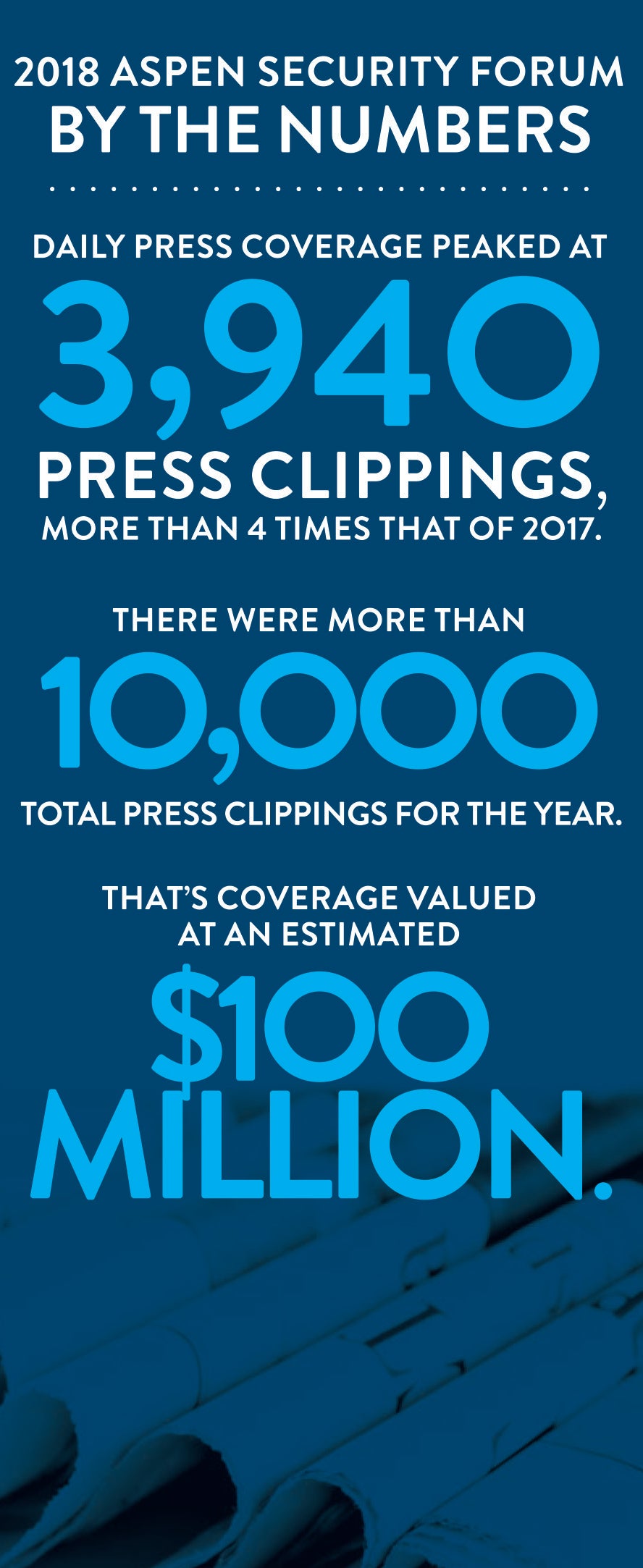 SOFT POWER: THE SECURITY FORUM’S MEDIA MIGHT
SOFT POWER: THE SECURITY FORUM’S MEDIA MIGHT
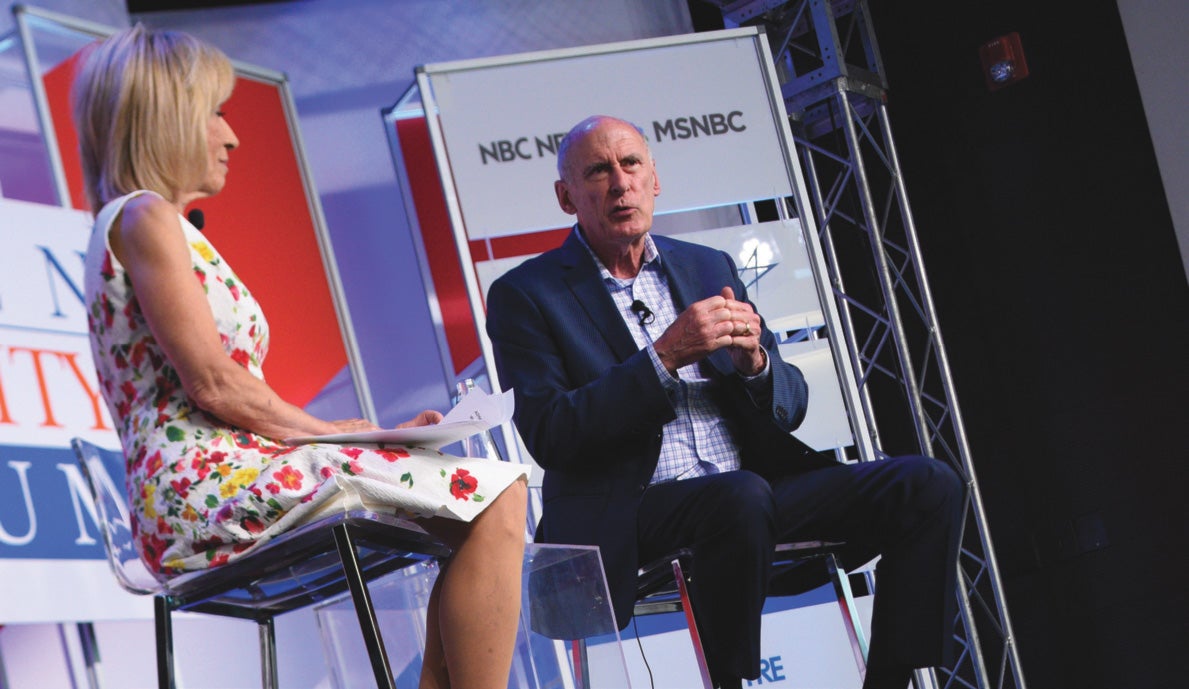 Every summer, the Aspen Security Forum brings top experts from government, intelligence, and homeland security together to discuss the most dangerous threats to the United States today-from North Korean missiles to Chinese cyberattacks to the Islamic State. Last year’s forum received a big boost from its timing just after the Helsinki Summit between Donald Trump and Vladimir Putin. Andrea Mitchell’s interview with Director of National Intelligence Dan Coats moved that story forward and went viral. And overall, the Aspen Security Forum maintained an outsized presence in the national news cycle, generating extensive TV, print, and online coverage from across the political spectrum.
Every summer, the Aspen Security Forum brings top experts from government, intelligence, and homeland security together to discuss the most dangerous threats to the United States today-from North Korean missiles to Chinese cyberattacks to the Islamic State. Last year’s forum received a big boost from its timing just after the Helsinki Summit between Donald Trump and Vladimir Putin. Andrea Mitchell’s interview with Director of National Intelligence Dan Coats moved that story forward and went viral. And overall, the Aspen Security Forum maintained an outsized presence in the national news cycle, generating extensive TV, print, and online coverage from across the political spectrum.
COMMUNICATIONS
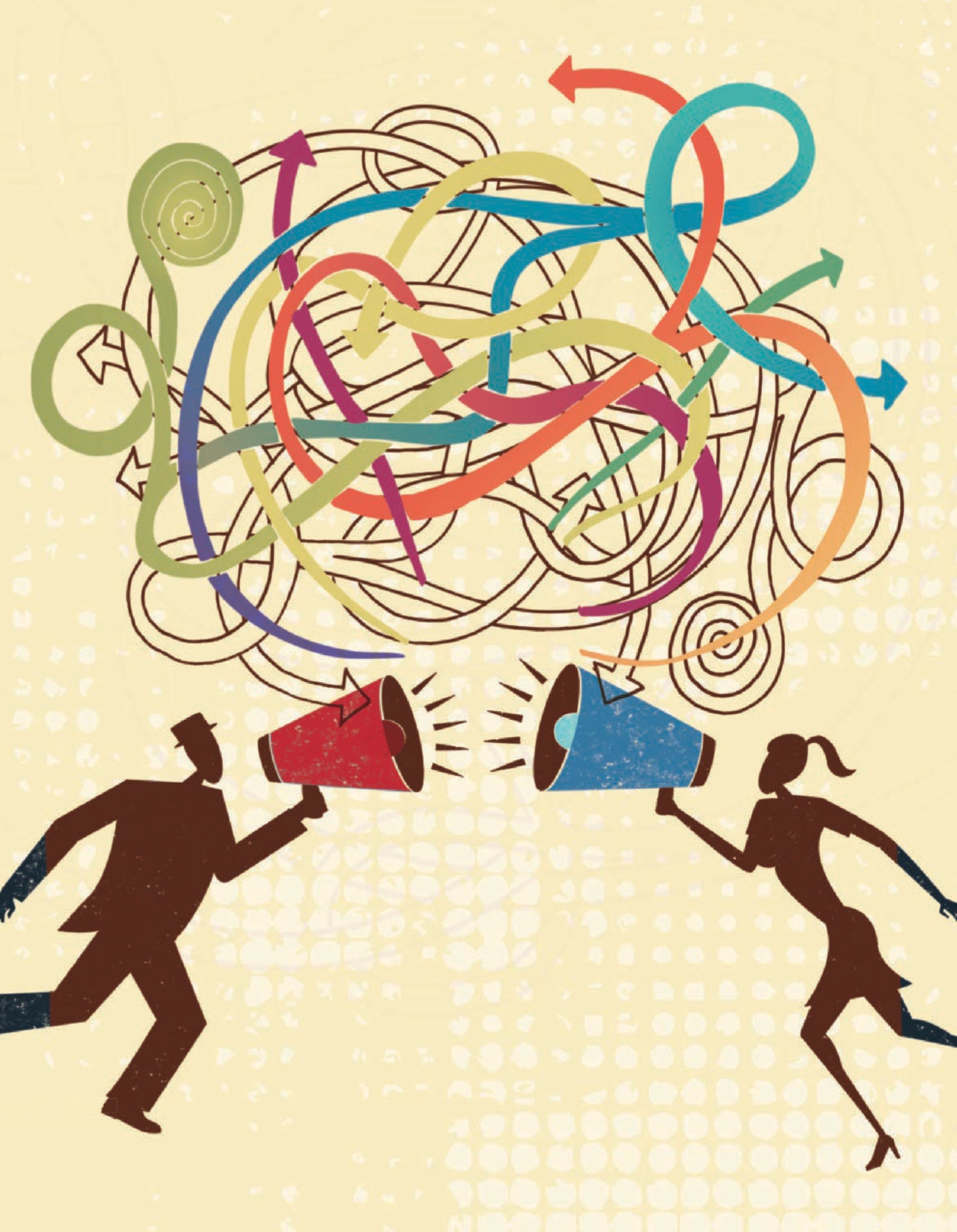 In an age of disinformation, ubiquitous social-media, foundering local newspapers, and unequal internet accessibility, the Communications and Society Program provides a crucial voice for thoughtful decision making. The program encourages industry leaders to think critically about the media, journalism, and information policy. Take Craig Newmark: the founder of Craigslist and Craig Newmark Philanthropies is an expert on how the public accesses information. Nevertheless, when he attended his first Forum on Communications and Society in 2006, it transformed his view of local journalism. “The Communications and Society Program has been instrumental to my understanding of the news-media industry,” Newmark says. “I’m now providing considerable support to journalism groups to strengthen trust in news.” In fact, Newmark’s philanthropy in journalism now exceeds $75 million.
In an age of disinformation, ubiquitous social-media, foundering local newspapers, and unequal internet accessibility, the Communications and Society Program provides a crucial voice for thoughtful decision making. The program encourages industry leaders to think critically about the media, journalism, and information policy. Take Craig Newmark: the founder of Craigslist and Craig Newmark Philanthropies is an expert on how the public accesses information. Nevertheless, when he attended his first Forum on Communications and Society in 2006, it transformed his view of local journalism. “The Communications and Society Program has been instrumental to my understanding of the news-media industry,” Newmark says. “I’m now providing considerable support to journalism groups to strengthen trust in news.” In fact, Newmark’s philanthropy in journalism now exceeds $75 million.
According to the John S. and James L. Knight Foundation, the Communications and Society Program’s work has ‘informed the Knight Foundation’s boldest grantmaking—doubling our commitment to strengthening journalism to $300 million over five years”
The program has also made a huge impact on the John S. and James L. Knight Foundation and its commitment to local journalism. The foundation cited a report from the Communications & Society Program’s Knight Commission on Trust, Media and Democracy as critical to its new funding process.
SEMINARS
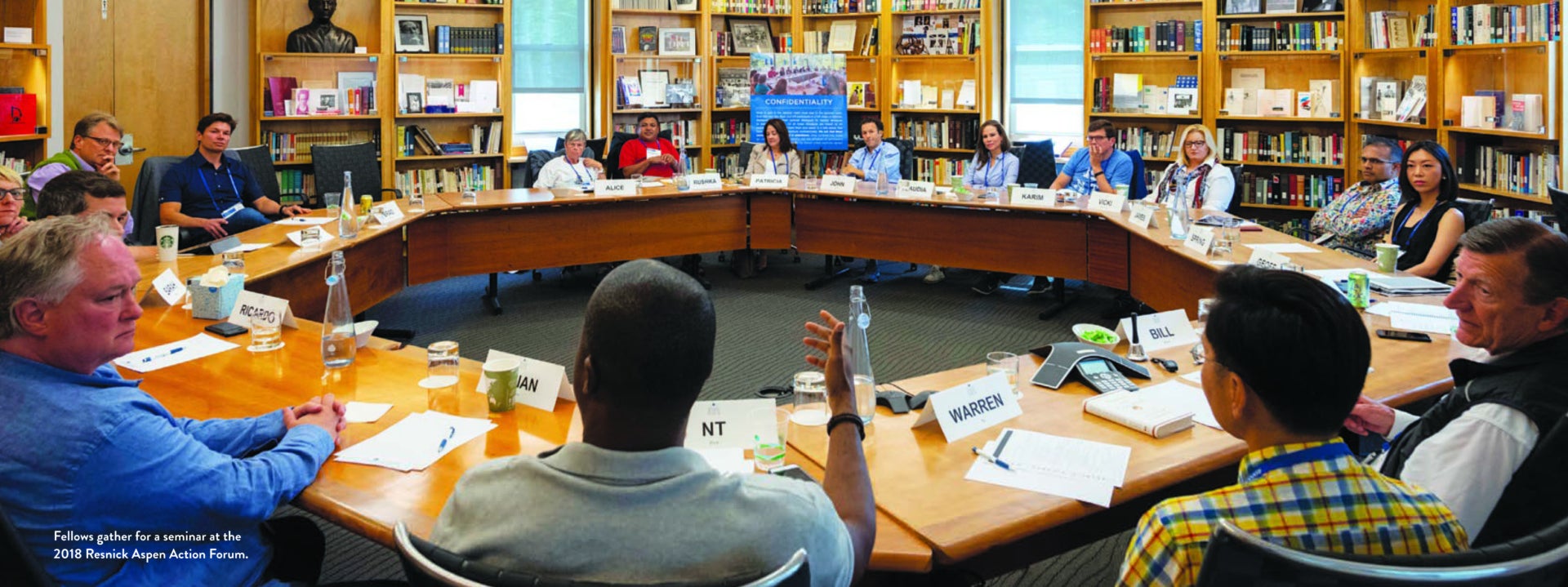
THE ROOM WHERE IT HAPPENS
The seminar room provides a space for leaders to reflect on timeless ideas and values and be challenged to put those ideas and values into action. Through text-based dialogue with expert moderators and accomplished peers, seminar participants refine their tools and intellectual analysis, text the wellsprings of their convictions, and enhance their capacities to think more creativity in solving the problems that confront society.
CHERISH THE THOUGHT
Todd Breyfogle
Ideas have consequences. I see this in almost every moment of moderating seminars. Feelings, insights, and experiences burst forth in seminars like seeds, gradually settling to earth, taking root, and reshaping the garden of our lives. I say, “our lives.” In each seminar, I find the moral ecology of my life tested and transformed. Even as I lead conversations, ideas jostle for space inside me, demanding that I think and live differently.
Leaving my position as a university professor to direct the lnstitute’s Seminars department was a career shift but also an expansion of my vocation-learning in service of living. I am less inclined to individualism and more drawn to community. I have been profoundly touched by deep friendships-a rare gift.
Aristotle speaks of arete, or virtue-excellence in fulfillment of a purpose. In moderating, I have become more moderate-less attached to the person I am and more attached to the person I am called to be.
CIVILITY & COMMUNITY
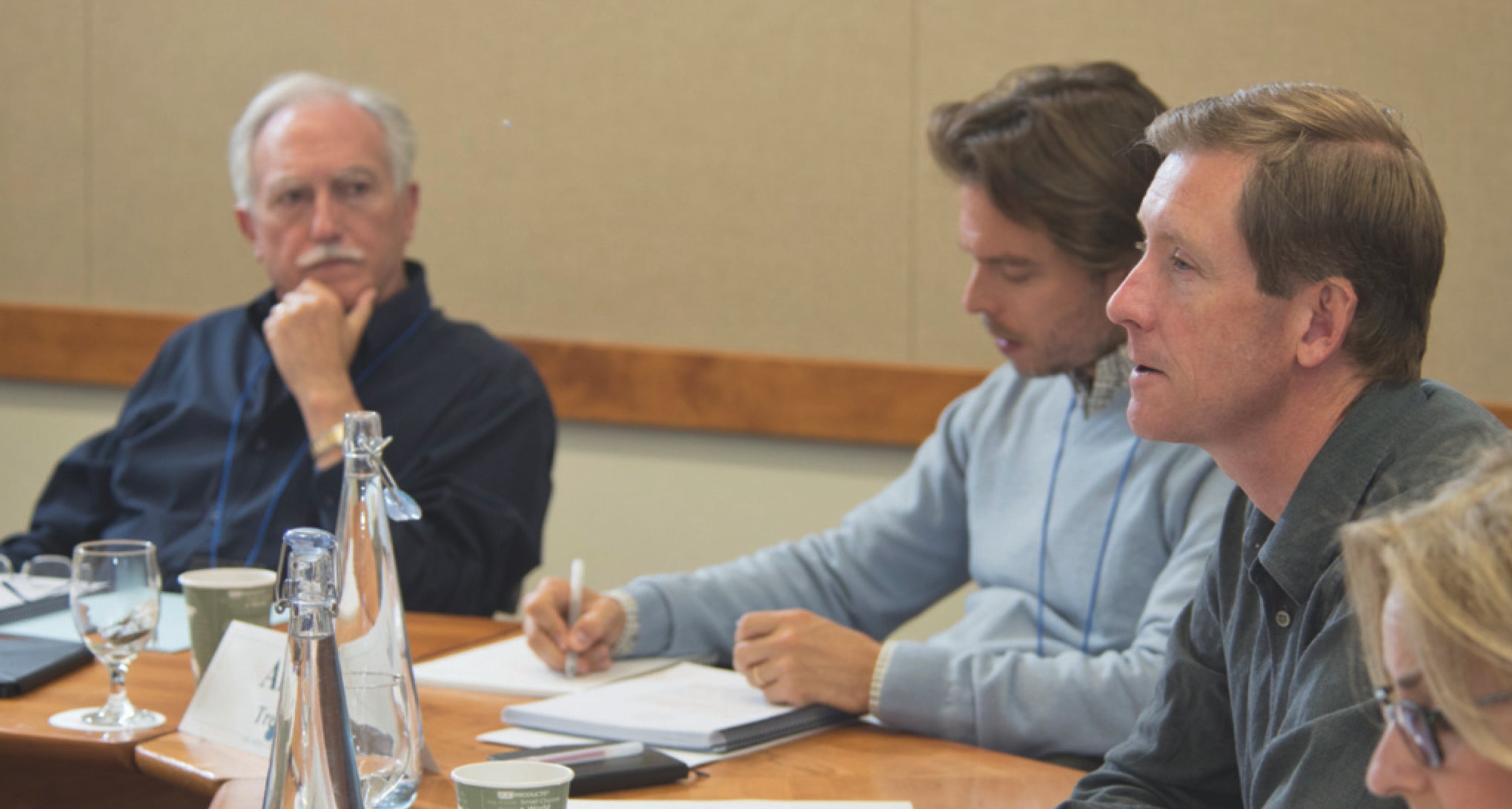 Learning never ends. But, for some, life experience isn’t enough; they seek unique opportunities to learn. The lnstitute’s Socrates Program brings together leaders from various fields to explore contemporary issues-like digitization, new media, global economics, and political upheaval-through expert-moderated dialogue. The seminars are Socratic explorations that allow a profound exchange of ideas. The program also gives attendees a new professional network and access to the broader range of the lnstitute’s programs.
Learning never ends. But, for some, life experience isn’t enough; they seek unique opportunities to learn. The lnstitute’s Socrates Program brings together leaders from various fields to explore contemporary issues-like digitization, new media, global economics, and political upheaval-through expert-moderated dialogue. The seminars are Socratic explorations that allow a profound exchange of ideas. The program also gives attendees a new professional network and access to the broader range of the lnstitute’s programs.
“Almost as soon as we sat down, something magical transpired. I met community leaders, civil servants, and other young professionals of all backgrounds and ideologies. While we had little in common, and argued passionately about policy, we agreed on first principles: the inherent dignity of all people, and the resulting respect we are each owed and owe to others.
I attended my first Socrates seminar in 2003 and have participated for the past 16 years, most recently in Cartagena, Columbia. Each time, I benefit from a rich intellectual experience and I make remarkable new friendships.”
—Kim Fortunato, President, Campbell Soup Foundation
